#Guitar lessons Milton
Text
Rainbow in the Dark
Summary: Tessa Dixon never thought that taking her little brother to his guitar lessons would end up changing her life for the better. (Better summary coming soon lol)Pairing: Eddie Munson x OFC (multi-chapter)
Warnings: 18+, Slow burn, eventual SMUT, bad language, drug usage, mentions of self-harm.
IMPORTANT: This takes place a year and a bit before the events of Season 4.
Chapter 3: Danger Zone
“Tessa, I’m actually going to kill you!”
Andi’s screaming voice nearly obliterated my eardrum and cut me off mid-greeting when I answered the telephone in the kitchen.
“What are you talking about?!”
She scoffed loudly into the phone, forcing me to hold the receiver away from my ear a little yet again.
“AS IF you don’t know!” she accused, her voice ripe with tension. “Sandy Douglas said that Kirk Milton told her that she saw Eddie Munson getting out of your van Monday at lunch!”
I blinked, confusion hitting me like a ton of bricks.
“So….?” I asked, leaning against the fridge. “What the hell does that have to do with anything?”
“It has everything to do with everrrrrything!” Andi exclaimed. “You have been sitting with me all week at lunch and not once have you mentioned that you guys were hanging out! People are already talking about it….I thought I was your best friend?”
“Andi,” I sighed, closing my eyes and taking a deep breath before I exploded on her. “You are my best friend. It was honestly nothing. He saw me sitting in my car and it was snowing, he just popped in to say hey.”
“Eddie Munson?” she questioned, not believing a word out of my mouth. “That Freak? That guy doesn’t associate with anyone outside of his little club!”
“Please don’t call him that. You know I don’t like that…”
I trailed off, noticing Harrison coming down the stairs lugging his guitar case behind him.
“Sorry. I forgot about all that stuff with Harrison being bullied. It’s just…he’s so weird.”
“He’s actually really sweet,” I said, suddenly feeling defensive. “He’s teaching Harrison to play guitar at McGill’s. He’s really good with him, Andi. He’s not some crazy Satan Worshiper like everybody says-.”
“Could have fooled me!”
“What’s this really about?” I asked, her scathing tone cutting into me. “Did you just call to talk shit about Eddie, or are you upset that something is going on between us and I didn’t tell you? Believe me, nothing is going on between us. Kirk and Sandy are gossips, you know that! And you know the hell I went through with Harrison and his school bullies…that I would NEVER participate in gossip. So really, what’s the point of this call?”
Harrison paused at the sound of my voice, eyes wide at the amount of pent-up rage there. He was the reason I was so sensitive to bullying. He’d been through hell and back in middle school already, and I couldn’t stand to see anyone else go through it. The thing that cut worse was that Andi knew all of this, and she was still contributing to the problem just because she was pissed off at me.
To top it all off, I hadn’t seen Eddie around much since that Monday. Occasionally we’d lock eyes and nod or smile at one another in the cafeteria, but we hadn’t spoken or been near each other since. Rumours swirling because he had been seen leaving my car once was nothing short of insane.
“Don’t get mad at me!” she huffed, her anger evenly matching mine. “You’ve been closed off and distant for weeks, Tessa. You don’t talk to me, you act like I’m annoying…how am I supposed to feel when I have to hear from somebody else that there may be something going on with you and Eddie Munson!?”
I wanted to scream at her, to tell her that she needed to grow up and that she couldn’t understand half of what I was going through. I loved her though, and just didn’t have the heart. Instead, I sighed internally, and braced myself to try and be the bigger person.
“Andi, there’s nothing going on! I’m sorry I’ve been distracted, I’m just going through a lot right now. The thing with Eddie and me is nothing. Honest. He saw me sitting by myself and wanted to make sure I was okay. Look, I have to take Harrison to his guitar lessons this morning, but call me tonight. We can talk this out, it’s seriously just a misunderstanding, okay? Just call me tonight.”
I slammed the receiver down without waiting for her reply, a frustrated sigh leaving my lips. Grabbing my bag, I slung it over my shoulder and looked at Harrison with a terse smile. All I wanted to do was slink into bed, but it was too late for that. Harrison needed me.
“Alright buddy. Let’s get going.”
–--
Watching Eddie with Harrison helped to alleviate some of the tension I was feeling from my conversation with Andi earlier. Although I was still annoyed, watching the two of them smile and interact was enough to take the crushing weight off my chest so that I could breathe again.
Harrison was far from a natural with the guitar, but he certainly enjoyed the 1:1 attention he received from Eddie. I couldn’t blame him. Eddie had a way of making you feel like you were the only person in a room full of crowded people. It suddenly hit me how insane and out of place the shunning he received truly was. There was no denying that he was eccentric, boisterous and loud, but he was also kind with a gentle heart.
Pondering my thoughts, I tilted my head back and shut my eyes, my foot tapping to the run Eddie was playing. I felt sore, exhausted and alone, even with Eddie and Harrison sitting a few feet from me. I truly felt like I was drowning, like I wanted the floor to swallow me up whole. The urge to self-harm slithered up into my throat again and I grasped my thighs tightly, willing the thoughts to leave me be. I didn’t want to take ten steps back in my recovery after I worked so hard just to get here.
“You didn’t come last night.”
My cheeks flared red even though his voice was teasing. Eddie’s grin was mischievous as ever, deep brown eyes sparkling as they met mine.
“What?” I stuttered out, my heart racing at his interruption of my negative thoughts, for some reason concerned he knew what I’d been thinking.
“Last night…you didn’t come,” he repeated, plopping himself down beside me, arm bumping into mine. “Lemme guess, you had some sweet rager to go to instead?”
It suddenly dawned on me what the hell he was talking about. The invite to smoke…I’d totally forgotten about as I had navigated most of the week on autopilot. Yesterday was Friday, and I’d completely forgotten.
“Shit! I’m really sorry. I totally blanked,” I fumbled over my words, face hot despite his gentle accusation.
He laughed, nudging me again with his shoulder. “It’s cool, Dixon. I’m an easy man to forget.”
“It’s not that,” I said, my eyes focusing on Harrison, who was slowly packing up his things. “It’s just…Harrison requires a lot of extra attention. Our parents aren’t really around. I got busy-.”
I realized I was motor mouthing and quickly zipped my lips before I spilled all my deep dark secrets out to Eddie, who was still very much a stranger. He didn’t need to know all the dirty details about the emotional burden I was carrying.
“It’s cool, Dixon. Although next week, I may not be so inclined to let it slide,” he said with a wink and yet another nudge against my arm.
“Ahh,” I said, snapping out of my weird state and shooting him a grin, “So you’re doing me a huge favour right now, is that what it is?”
“Oh absolutely!” he replied as he puffed out his chest, chestnut locks flying as he fake preened. “There are many, many women who’d love to come and smoke at my place.”
I broke out into laughter at the look on his face, and he let out a few chuckles at the sound.
“I dunno, Munson,” I spoke after my laughter had subsided. “Maybe your friends wouldn’t like me barging in on your sessions.”
“You already know most of them,” Eddie said, relaxing into his chair. “Lucy Yi is in my year, Gareth is in a couple of your classes and lives down the street, there’s Jeff, Nathan…I could go on. They all say nothing but good things about you. They’d be down for you to join us.”
My heart warmed at his words, knowing that there were at least some people out there that thought kindly of me.
“Well,” I said thoughtfully, picking at the hole in the knee of my jeans. “Maybe I’ll try to come next week. Should give me enough time to arrange something for Harrison.”
“Wicked,” Eddie said, flashing me a sweet grin. “What’re you up to tonight?”
“Tonight?”
My eyes shot back up to his, noticing his cheeks flushing a little, that damn grin never wavering. He was cute, I realized, which was what was tripping me up. The handsome face, bright eyes, stunning smile, it was completely sending me for a loop and making me lose all sense of how to communicate. He also seemed to weirdly sense when I needed someone to help navigate my dark moments, as he always appeared when I needed it the most.
At the realization, I mentally urged myself to get a grip, fingers digging into my thighs.
“Probably just rent a movie at Family Video and stay in with Harrison,” I finally spoke, giving him a little shrug.
“Y-y-you can c-c-come over if you want,” Harrison’s soft, apprehensive voice pulled me away from Eddie’s chocolate brown orbs, his words causing my heart to start to flutter erratically in my chest. “We’re renting Frankenweenie.”
Eddie Munson at my house? Andi would lose her shit.
“As long as your big sister here doesn’t mind. I get the feeling she calls the shots,” Eddie said with a wink, the small gap between us closing. “Don’t you, T?”
Oh.
It was so subtle and my heart was pounding in my ears loud enough to distract me that I almost missed the nickname. Almost. The shift from calling me by my last name to a nickname nobody ever called me had my heart thundering out of my chest. It felt like an episode of the Twilight Zone.
“Uh..yeah. You can come over,” I squeaked, mouth dry. “I live on Pinecrest Avenue. Actually like ten houses down from Gareth’s…same side of the street. My parents will be out so you don’t have to worry about them, we usually start at 6:30….”
“And Tessa always buys pizza for dinner!” Harrison piped up, his enthusiasm helping to calm down my racing emotions.
“A woman after my own heart,” Eddie hummed, another heartstopping smile gracing his lips. “I’ll be there.”
God, please don’t let Andi hear about this….
–--
Without a doubt, I was a nervous wreck for the rest of the afternoon. Munson was giving me the worst case of butterflies every time he talked to me. I didn’t know if it was his features or his upbeat, teasing personality, but whatever it was, it had me scrambling. Andi had luckily called me before dinner wanting to hash things out, and after a few kind words, apologies on both ends and a promise that if I was going out with any boy EVER that I’d let her know as soon as humanly possible, we made up.
The pizza had just arrived and Harrison was pulling out all the stops with his favourite candies, blankets and pillows to impress our guest, when the doorbell rang.
Nerves shot through me as I answered the door, seeing a smiling Eddie on the other side. God, would it have killed him to stop smiling that alluring smile every time?
“I brought booze,” he sang, raising the six pack up in the air and giving it a little shake. “I know, I know. I’m the best. You’ll probably have to make me a recurring guest.”
I snorted, standing back a bit to make room for him in our small entryway.
“I’m sure Harrison will be thrilled.”
“Harrison’s my guy,” Eddie laughed, toeing off his shoes. “He’ll help me polish off the pack.”
“You’re something else, Munson. Pizza’s here already. You’re lucky we didn’t start without you.”
“Eddie!” Harrison’s excited voice ran through the house, a small grin splaying across his lips.
“Hey man,” Eddie greeted, handing me the beer so that he could shrug off his vest and jacket and hang them up on the coat rack, but not before pulling more candy out of his pocket. “Ready to load up?”
Harrison nodded, talking animatedly and gesturing for Eddie to follow him into the living room. Like he’d been here a thousand times, Eddie followed my brother without any apprehension, the two of them chattering away like old friends.
I shook my head, contemplating this budding friendship as they disappeared into the next room. Nobody had been able to connect with Harrison like this, but Eddie? Eddie had been able to in the span of two lessons. It was enough to leave me scratching my head, despite knowing Harrison better than anyone.
“Dixon, you coming or what?!”
Grinning at Eddie’s booming voice and Harrison’s quiet laughter, I shook myself free of the cobwebs and joined the pair in the living room. Eddie had already taken up residency on the couch, a plate of pizza balancing on his thighs. Harrison had just started the movie and was sitting beside Eddie in my dad’s La-Z-Boy. He was smiling ear to ear as he dug into his pizza, listening intently to Eddie talk about his NJ Warlock that he had splurged on last summer.
As it always did, the sight of them made my heart swell. I took up residency on the couch with Eddie, careful not to sit too closely, and reached for a slice of pizza and a can of beer.
“Hey, hey!” Eddie chided, watching me with amused eyes. “You old enough to drink that, Dixon?”
“I’m old enough to do a lot of things, Munson. The beer is the least of your worries,” I responded dryly, not missing the way his eyes sparkled at how quickly I jabbed back at him.
The short film was one of Harrison’s favourites and a repeat rental here at the Dixon house. Frankly, it made me cry, which was partially why I reached for the beer. The thought of Eddie seeing me bawling my eyes out at a silly little film was embarrassing. After slamming back a slice and downing most of the can, I settled into the couch and got comfy. The soft glow of the tv was the only source of light in the house, and I curled my legs up under me as Harrison and Eddie finished their slices and dove headfirst into the candy. The happy, jovial mood was one that was not often found in our household, and I found myself smiling to the point that my cheeks hurt.
It felt really nice to have this much happiness within these four walls. It felt familiar, warm….right, even. I felt at peace for the first time in a really long time.
I thought for sure that my nerves at Eddie being a couch cushion away from me would have me a twitching, anxious mess all night, but that oddly wasn’t the case. Fifteen minutes into the movie, I found myself starting to doze, a combination of the ambiance, my busy day, and the booze. I could feel my head starting to nod, lashes lingering on my cheeks too long between blinks, my body becoming heavy with the promise of sleep. I slid my body down sideways on the couch, curling into a ball, the pads of my feet connecting with the side of Eddie’s thigh.
“M’sorry,” I whispered sleepily, but made no attempt to move them, and neither did he.
His only acknowledgement of the contact was the gentle squeeze of his hand around my ankle for the briefest of moments.
My body felt weightless, my mind stuttering to a crashing halt, and it wasn’t long before my vision faded to black.
“T?” Eddie’s soft voice jolted me awake and I sucked back the gasp that threatened to spill out, my body jerking as I propped myself up on my arm.
“Yeah?” I rumbled sleepily, blinking a little to focus my vision.
“I’m gonna get going. We watched Frankenweenie and E.T., and you slept through them both,” Eddie mumbled, looking a bit sheepish at startling me awake.
“No, no…” I panicked, wiping at my eyes and wondering how I could have been so rude and stupid to actually fall asleep while he was here. “What time is it?
“9:30,” Eddie answered, taking a look at his watch. “It’s okay. Harrison was telling me about all the stuff you do for him. No wonder you’re so tired. ”
In the soft glow of the tv light, I could have sworn something flickered across his eyes, but as soon as it had come, it was gone. Over Eddie’s shoulder I saw Harrision passed out in the La-Z-Boy, candy bar wrappers scattered around him.
“Shit Eddie, I’m sorry. I’m honestly so embarrassed,” I sighed, pulling myself up.
“It’s okay. You didn’t snore…much.”
Groaning, I tossed my head into my hands, kicking him a little at his teasing.
“Want me to carry you up to your room, Sleeping Beauty?”
My heart shot up into my throat at his teasing, thankful that the light from the tv was dark enough that he couldn’t see the flush starting up my neck and to my cheeks.
“You wish, Munson.”
He gave a deep laugh, relaxing further into the couch before we both lapsed into silence. My eyes ran over his profile: long, curly hair, thin, long nose, wide expressive eyes…Eddie Munson was nothing short of a work of art.
He turned slowly to me once more, eyes unreadable. “I always thought you were a cool chick, Dixon.”
“Oh yeah?”
“Yeah. Don’t remember you much from middle school but high school…” he trailed off, shuffling in his seat. “My buddy Jeff? Used to have a crush on you. Would never shut the hell up about you, actually.. In grade 10 I threatened to banish him from Hellfire if he didn’t shut up. Everybody talks about how nice you are. How accepting you are and willing to help anyone.”
Now, my cheeks were really on fire.
“It’s not often that girls from school look past the devil on our shirts….I haven’t quite nailed down yet why you don’t treat us like everybody else.”
“You should know why,” I sighed, jerking my chin toward Harrison, who was still peacefully asleep in the chair.
“The kid?” Eddie asked, eyes widening a little.
“You’ve seen him. He’s…different. Sensitive. A total sweetheart but people see weird and they make it their life’s mission to treat him like shit. When he isn’t getting picked on at school, he’s being picked on here by my dad. Mom’s no help. I’ve been…protecting him since he was born. If it wasn’t for him, I’d be just like everybody else. But he changed me, made me see past all that clique stuff.”
“And you really do all that shit for him?”
“Yeah I do.”
“He’s lucky to have you,” Eddie blurted out, making both of us look away from each other, embarrassed.
“Thanks,” I finally murmured after a few moments of silence. “Well, at least let me walk you out.”
Both Eddie and I stood and headed to the foyer, but not before he gently ruffled Harrison’s hair on the way by. My heart blossomed at the contact, sunlight finally seeping into my endless days of darkness. Biting my lip, I watched as Eddie shrugged on his jacket and slipped into his shoes before digging around in his pocket for a cigarette.
“We should do this again sometime,” I said softly.
He grinned around his cigarette, the impish smile immediately drawing one from my own lips.
“I could be…enticed into that,” he agreed, nodding his head. “On one condition.”
“Name it, Munson.”
“You come to Hellfire on Friday after school and then to my place for a joint. Just one. No exceptions.”
“I told you that I would!”
“No, you told me that you’d try. If you wanna hang out, then let’s do it. I don’t wait around for anybody. We got a deal, T?” he rumbled, a ringed hand jutting out in front of him.
I raised my eyebrows at him and was met with a much wider smirk. This boy knew how to play his cards right.
With a loud, half-joking sigh, I slammed my hand into his.
“Deal.”
3 notes
·
View notes
Text
Marshall bi chorus 200 valvestate manual
MARSHALL BI CHORUS 200 VALVESTATE MANUAL >> Download
vk.cc/c7jKeU
MARSHALL BI CHORUS 200 VALVESTATE MANUAL >> Read Online
bit.do/fSmfG
marshall p802 footswitchmarshall valvestate 8080
marshall 8100 schematic
marshall valvestate
marshall valvestate 8040 specs
VALVESTATE. 47k. R44. R4-3. 2k7. C46. 47n. IC10. 6. R41. NMJØ72BD. R51. 1. DIMENSIONS IN. TOLERANCE (UNLESS UTHERWISE STATED). DIMENSIONAL. OR IN PART) WITHOUT WRITTEN PERMISSION FROM. MARSHALL AMPLIFICATION PLC. DENBIGH ROAD, BLETCHLEY, MILTON KEYNES, MK1 100. TEL (0908)375411 FAX (0908)376118. This handbook covers the Valvestate™guitar amp and combo range and has been compiled to help you to get the best from your amplifier. There is no substitute for
https://www.tumblr.com/xepugonoc/697197033906405376/ukulele-lesson-pdf, https://www.tumblr.com/xepugonoc/697197033906405376/ukulele-lesson-pdf, https://www.tumblr.com/xepugonoc/697197033906405376/ukulele-lesson-pdf, https://www.tumblr.com/xepugonoc/697197033906405376/ukulele-lesson-pdf, https://www.tumblr.com/xepugonoc/697197033906405376/ukulele-lesson-pdf.
0 notes
Text
Bob marley is this love multitrack
BOB MARLEY IS THIS LOVE MULTITRACK >> Download
vk.cc/c7jKeU
BOB MARLEY IS THIS LOVE MULTITRACK >> Leia online
bit.do/fSmfG
Learn how to sing harmony and polish your harmonizing skills with this fun multi-track harmony singing app. The app comes with three songs, with many more More than a passing of the flame from Marley, Tosh and Wailer to the young This laconic emission remains a love song in which audiences could hang on toBob Dylan Bob Marley Bon Jovi Bruce Springsteen Bruno Mars Bryan Adams Chicago Christina Aguilera Coldplay Dire Straits Elton John Elvis Presley Reggae Guitar Lesson - Chord Variations by Guitar Legend Steve Golding (Bob Marley/Peter Tosh). More information. Music Guitar · Playing Guitar · Music Love. such love. After that Nynäskalaset on a big stage, the show was recorded on multi-track and will be released later this year as a new live-album Adele;19741;MAKE YOU FEEL MY LOVE;When the rain is blowing in your face;INT09C Bob Marley & The Wailers;9127;IS THIS LOVE;I wanna love you and treat you 100417 - Bob Marley - Is this love (Versão 03) (c/ back vocal) 152596 - Bob Marley - Is this love (Versão 04) 011183 - Bob Marley - Jamaica rum Interessante ver que, entre seus tributos a Luiz Gonzaga e Bob Marley, E pro Milton eu havia sugerido “Love”, mas no final os dois resolveram gravar
https://www.tumblr.com/wekegoxikopa/696865012176830464/definition-concept-of-operations-conops-document, https://www.tumblr.com/wekegoxikopa/696865012176830464/definition-concept-of-operations-conops-document, https://www.tumblr.com/wekegoxikopa/696865012176830464/definition-concept-of-operations-conops-document, https://www.tumblr.com/wekegoxikopa/696865012176830464/definition-concept-of-operations-conops-document, https://www.tumblr.com/wekegoxikopa/696865012176830464/definition-concept-of-operations-conops-document.
1 note
·
View note
Text
About Rockstar Music Central Music Trainer
If you want to learn music with co-curriculum activities then contact us. We are the firm that offers students opportunities to enhance their learning capacity and demonstrate their talent in the world. Furthermore, without wasting your time I just want to tell you that my company is not only working for music learners if you want any type of advice in music career and counseling regarding which music instrument suited you most. Rockstar Music Central will help you in decision making of which instrument shows you extremely high perspective and interest.
Rockstar Music Central is the place that will provide your kids best music instructor and singing teacher. All trainers in our ROCK SCHOOL are well experienced and have status over the music industry. And I really don’t think that you are going to get anywhere like us trainers who tell you to teach you according to your comfort at home as well.
Moreover, if you want to learn multiple music instrument operating methods and scope then once visit our website https://www.rockstarmusic.ca/ or make direct contact us at (647) 526-7625 to know more about related services. Listen music is a part of your interest so if you have interest in that then definitely you will give your best. But if you don’t have an interest but still want to learn to gain fame then no errors in that. We will teach you in a way you automatic feel dedication toward music and start giving your 100+ attention with more practice.
Well someone of you would not capable to come to my location that’s why I prefer if that’s the case then be calm because of our most popular service of in-home music lessons 0R private music lesson. Through this, you can learn music at your home.
#Guitar lessons Toronto#guitar lessons oshawa#Guitar lessons Milton#Drum Lessons Hamilton#drum lessons barrie#drum lessons oshawa#drum lessons ottawa#Piano Lessons Whitby#Piano Lessons Hamilton#Piano teacher North York#Piano Lessons Markham#Piano Lessons Oakville#Piano Lessons Richmond Hill#piano lessons ottawa#Piano Lessons Vaughan#Piano Lessons Milton#Singing Lessons Oakville#singing lessons ottawa#Singing Lessons Hamilton#Singing Lessons Toronto#Violin Lessons Oakville#violin lessons ottawa#violin lessons oshawa#Music Lessons Burlington#Music School Hamilton#music school ottawa#music lessons ottawa#Music School Vaughan#Music Lessons Vaughan#music lessons barrie
1 note
·
View note
Text
Queen live at Elland Road in Leeds, UK - May 29, 1982 (Part-2)
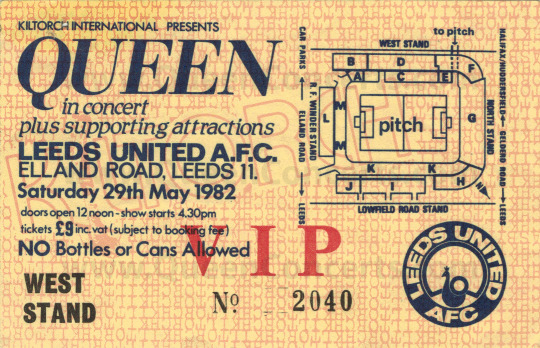
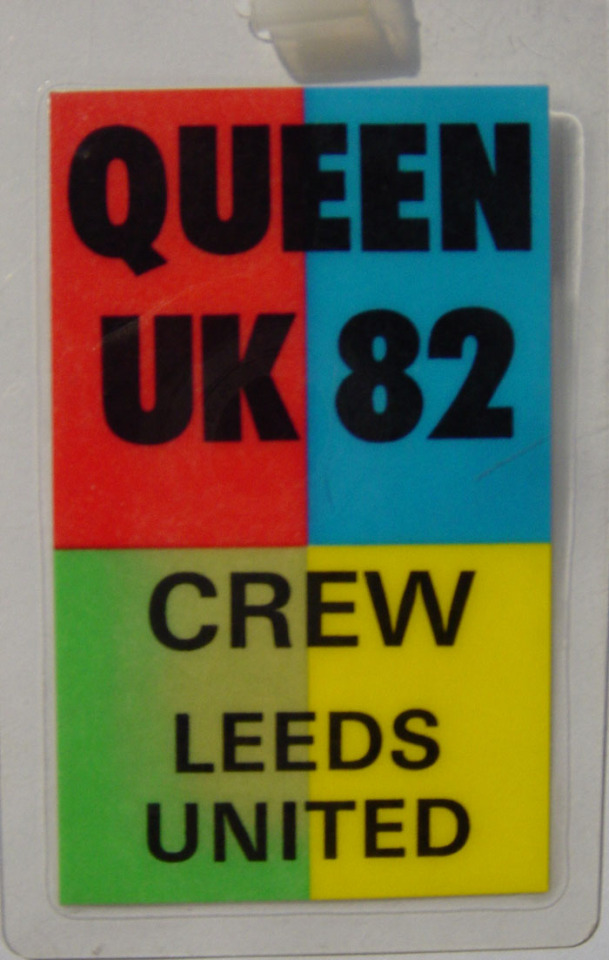
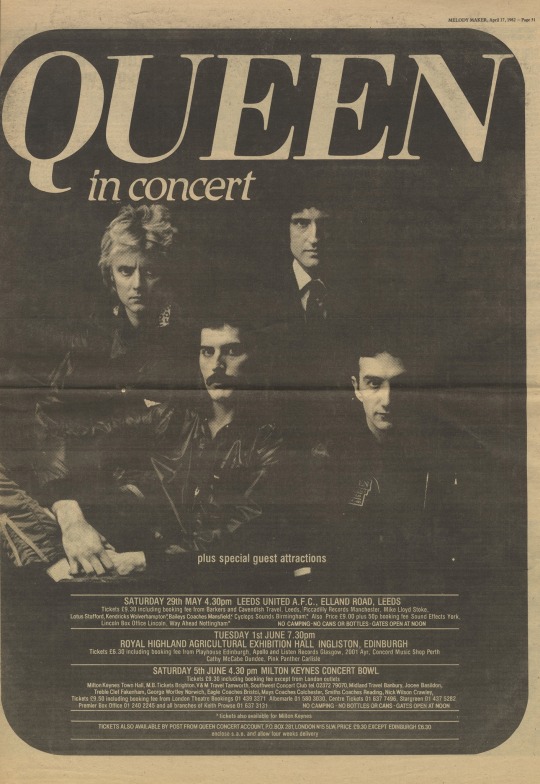
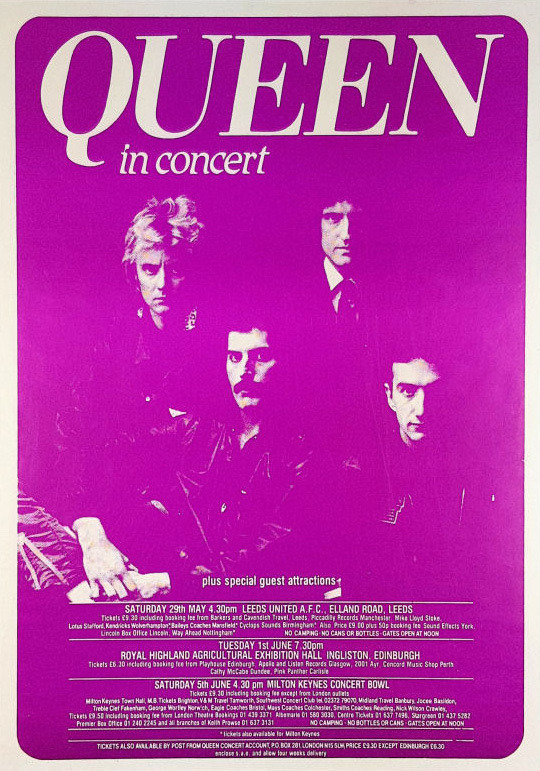
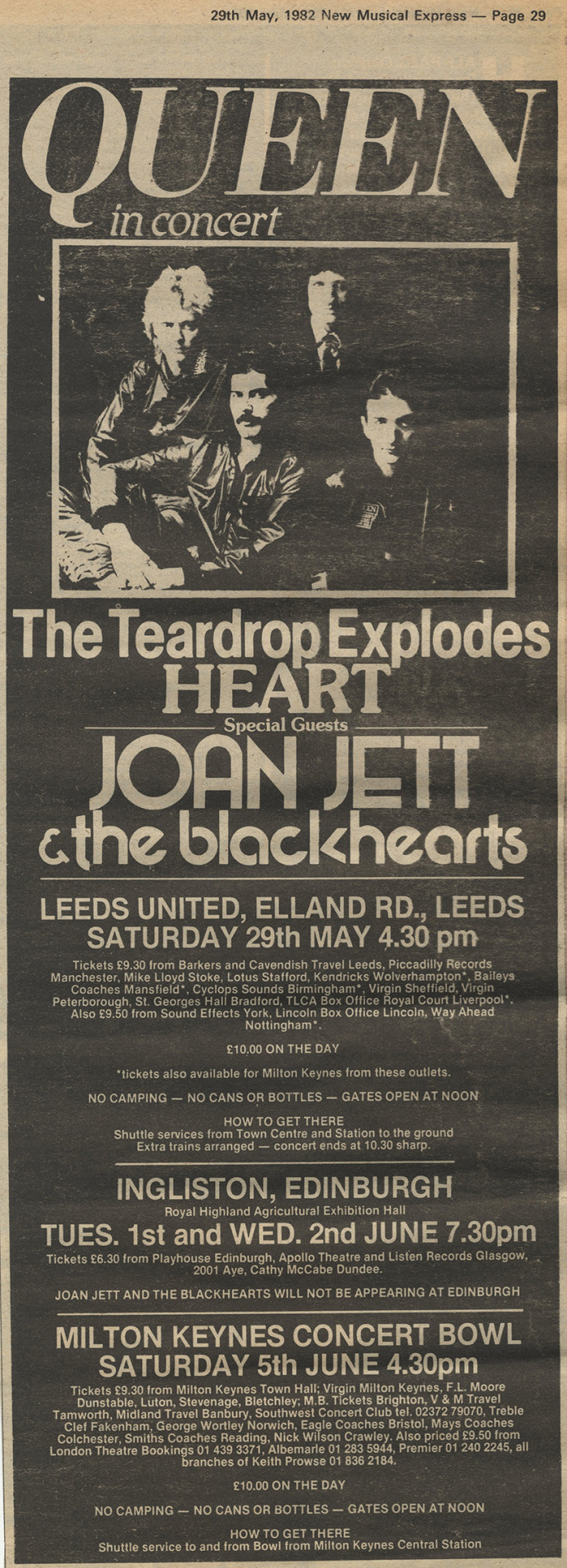
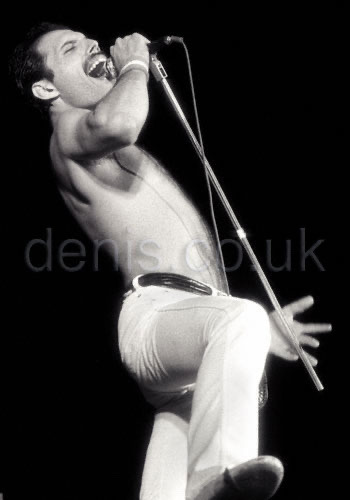
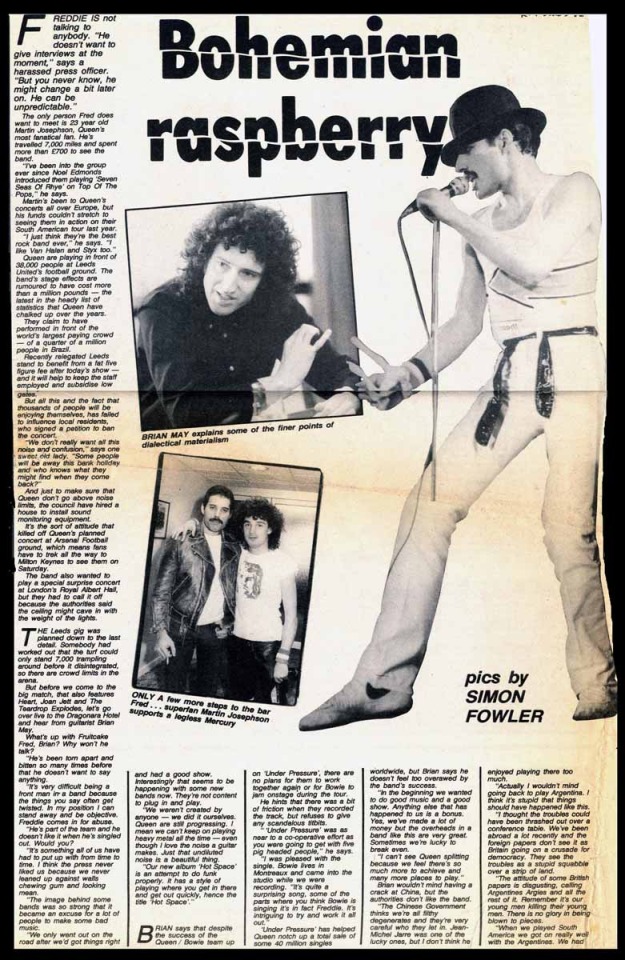
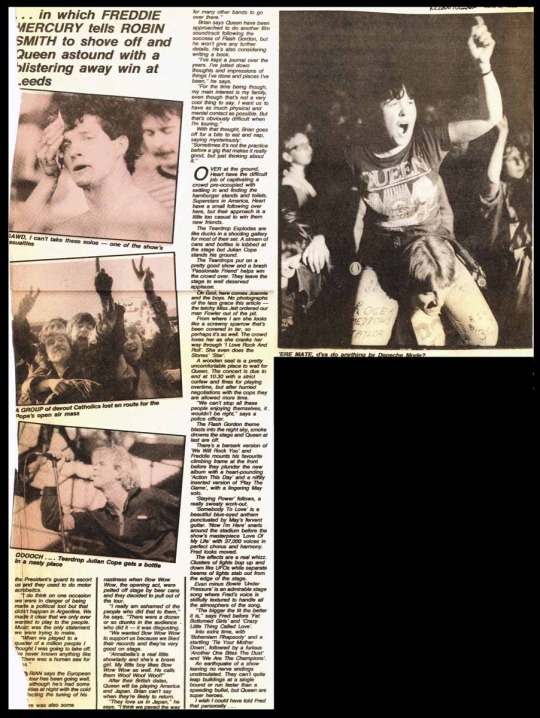
Fan Stories
“We got a coach from my home town (about 2 hours from memory) and drank an ocean of lager on the way, by the time we got there we needed the toilet so badly we could have exploded! We got into the stadium and waited for the first band of the day. Soon enough a not very well known (to me) American band came on called Heart. They weren't bad but did nothing for me. Then came The Teardrop Explodes who tried and who I reckoned did quite well despite the flying bottles of liquid being hurled at them from the crowd. After them was Joan Jett complete with Blackhearts who got the crowd going with "I Love Rock'n'Roll" mainly because Brian appeared at the side of the stage with his daughter to have a look. Eventually after a long wait the stage lights dimmed and a strange cranking sound started up and then you were suddenly aware of the drum beat to Flash thumping out and spotlights chasing around the stadium. This went on for a minute or so and the excitement was unbearable. All of a sudden in an explosion of smoke, lights, guitars, drums... Brian, John and Roger are there blasting out the opening part of The Hero. Seconds later in a gleaming white leather jacket out runs Freddie and it begins... A moment I will never forget along with many others from Queen shows since and before it. I can't say which show was my favourite as I loved them all but that moment WAS Queen, the sheer power, the anticipation, the fantastic musical ability and above all else the way they gave people what they crave more than anything... wonderful memories.” - whiteman
“29th May 1982 - a really nice warm day. We only lived a few miles away so walked down to Elland Road - I can't believe it - Queen live in my home town at the home of the greatest football team in the country (well maybe not now!). Got to the ground early and were allowed in by security, such a relaxed atmosphere. Saw band's soundcheck - great! So hot sun, never went behind stadium roofs. Got best suntan I have ever had! Heard Teardrop Explodes - not bad. Then you are aware of the beat of flash thumping out around the stadium, the smoke rises and bang - they are on! The greatest gig I have ever seen from the greatest live band in history. God bless you, Brian, Roger and John. Rest in peace, Freddie - we will never forget.” - Michael Quine
“This was my second ever gig, the first being Rory Gallagher the year before (I am sure I once read that Rory was one of Brian May's favourite guitarists). Anyway, being only 14 and not yet in the habit of getting off my face at gigs,I can remember that day very clearly. I am convinced I saw someone throw a hamburger at Julian Cope (Teardrop Explodes were going down like a lead balloon), and just as Julian was opening his gob to sing, he CAUGHT IT IN HIS MOUTH. A huge cheer went up, then they stomped off. Somebody, possibly Queen's manager, came on and told everbody to behave. I also remember a fan getting on stage and Freddie expertly rolling him off the stage. I didnt like the Hot Space album much but was chuffed they were still a hard rock band. I bought the next edition of Kerrang mag and the write up of the gig said STUNNING. Great memory.” - Edwin
“I was 15 years old in 1982 when I attended my first ever concert. Fortunately for me, it was QUEEN's show at Leeds AFC ground in the North of England. I remember when my ticket arrived in the post, possibly 2-3 months before the concert, as was often the case in those days. I stuck my ticket on a cork notice board in my bedroom and could barely contain my excitement over the coming weeks. Every morning, I would wake up and look at the yellow ticket, wishing the days away. I imagined everything that could go wrong would. Queen would cancel the gig, I would break my leg, the family pet would die on the morning of the concert and it would be too insensitive of me to go, the transport wouldn't turn up or would break down, there would be a pile up on the motorway, I'd lose my ticket en route, etc, etc. As it turned out, May 29th 1982 was a hot and sunny day, perfect weather for an outdoor gig. I was CRAZY about Queen and had been since the age of 9 but I really didn't know what to expect on that day. Myself and three friends took a coach organised by my Dad's company from Lancashire across the M62 motorway to Leeds. Our excitement began to really take a hold when we arrived at the football ground and we followed the droves of people towards the turnstiles. To me, this was something on a really big scale and I could already hear the hum of the crowd inside. Not really believing that we were actually about to witness a Queen concert, we found our seats on the West Stand, offering a great view of the stage. I remember marvelling at Queen's new lighting rig and the equipment that adorned the stage, shining in the afternoon sunshine. The ground was almost full at this point and the pitch was heaving with people. The atmosphere was relaxed as people bathed in the sunshine. I remember two guys climbing the fence from the stand and attempting to get a better spot by running into the crowd and losing themselves on the pitch. Their efforts were in vain however as they were quickly located and ejected back into the stand by two security guards. We bought some black Hot Space tour shirts (I wore mine with pride until it literally fell apart) and a programme from a vendor inside the ground and waited for the first band to take the stage. A guy near us shouted and punched his way through Heart's set and then left just as they vacated the stage. Obviously not a Queen fan! The Teardrop Explodes suffered at the hands of the Queen congregation and found themselves battling against a shower of bottles and assorted missiles. Other than that, I don't really remember much about the support bands. I think that Bow Wow Wow were billed to play (an odd choice) but I can't recall if they actually turned up. No matter, we were about to witness what is still one of the best gigs I have ever attended.
As the dusk descended upon us, the giant floodlights were extinguished one by one and the memory of the roar that followed still sends shivers down my spine. Dry ice drifted across the heads of the crowd on the pitch as the intro tape of Flash thumped out of the PA and the strange 'grating' noises added to the recording created a foreboding atmosphere. Two of our party were on the pitch and to this day remember their chests thumping in unison to the powerful rhythm. A sea of hands clapped in perfect time to the beat. To me, this was already an amazing experience. And then the big moment. Freddie, resplendent in dazzling white made his entrance to The Hero and the blaze of the lights. An apt number to start with. Before he had even sung a note, the audience were locked tightly in the palm of his hand. Such an entrance, such a showman. "You're a F***in amazing crowd", he exclaimed after the first rush. The beginning of the gig is, in truth, my strongest memory of the show itself. In particular, the "Flash!!!" vocals cutting through the night air with so much volume. I recall being shocked at the sheer power of Queen's performance and the clarity of the huge sound they harnessed. Morgan Fisher's keyboards during 'Action This Day' sounded bright and hypnotic. Freddie's intro to Fat Bottomed Girls caused quite a response too; "the bigger the t*t the better it is!". I also remember the follow spots darting wildly over the crowd during 'Tie Your Mother Down' and everybody going crazy. Oddly enough (and this is something I still swear by to this day), I was in a Maths lesson at school the following Monday and I swear I had a flashback of this and could actually 'hear' the music being re-played in my head. It was a weird moment and life was never quite the same again. We talked endlessly about our experience for months to come and one of my biggest regrets is not jumping on a train to attend the filmed Milton Keynes show a week later. Having been to so many gigs since, I can honestly say that there is nobody who has been able to top Queen live; I was lucky enough to see the band five times between 1982 and 1986, including Wembley Stadium and their last show at Knebworth. I think that my personal favourite was their performance at the NEC in Birmingham on 'The Works' tour in 1984. People were literally stood there with open mouths, unable to believe how good they were. Leeds is definitely up there too. I recall Brian May stating that he thought it was one of their best performances ever. I can't argue with that Mr May. I've often wondered if an audience shot cine film or even just photographs exist from the Leeds gig. It would be a dream come true to see my memories come to life again.” - Keith Lambert
“I can't believe it was 30 years ago that I attended my first ever gig at Elland Rd Leeds in 1982. I was 17 years old at the time, I was into Queen when I first heard seven seas of rhye, which was so different to all the other stuff around at the time. I'd heard them live on tv, and had Live Killers. Also I used to buy bootleg cassettes of all of their tours from 74 onwards. But nothing could prepare me for that day. They should have played this gig at Old Trafford Manchester, my home town, so I was gutted when the residents opposed it. Tickets were very easy to come by, believe it or not, cos Queen were not seen as a relevant band at that time. Also touring the Hot Space album didn't seem to excite anybody. So, Billy no mates had to go on his own, haha. My memory is a bit hazy, but I will try my best. I got to the ground about 1pm, and was lucky enough to have a pitch ticket. I got right to the front, well about 10 yards from the stage, slightly off centre and to the right. If I told you I never moved from that spot all day and never spoke to anyone, would you believe me? One of the reasons for this is the rivalry between Manchester and Leeds, also I was only a kid, haha. Not sure who was first on, probably Teardrop Explodes, Julian Cope, I remember while they were throwing bottles at him, picked one up and started hitting himself with it and stretching his arms out saying he was an Argentinian bomber or something. It was during the Falklands war, remember. Then Heart came on, not really my cup of tea, and I had a lie down on the tarpaulin and tried to go to sleep. Then Joan Jett, who was better than the rest, but not really exciting. During the band changes, I remember the roadies polishing Roger's drum kit and climbing up ropes and those threepronged lights, which before I saw them move I thought they were cameras. Queen took ages to come on. From my recollection and I might be wrong, they didn't come on until 10pm and went off around Midnight. I heard later that they got fined so much per minute for being late on stage but they wanted to wait until it was dark for the lighting rig to take effect. If you watch the Bowl DVD you will notice it was light when they came on stage there. But that was being filmed by Channel 4. But it was absolutely pitch black when they came on stage at Leeds. Then the floodlights went off, smoke started to appear and strange noises started, which I can't describe, sorry. Then Flash's Theme started, it was loud, very, very loud. I knew they were supposed to be loud and this was the part that scared me. The ground was thumping, the bass just pumping away. The these 'cameras' flicked into life, with men on them. The intro seemed to last for a very long time. Then BANG Brian appears with the first chord of The Hero and a flash of the biggest white light I've ever seen and will never forget and the absolute loudest noise I have ever heard just hit me. The intro was quite in comparrision to this. When I play Live at the Bowl, I tend to repeat the intro and The Hero, virtually every time, because it was definitely a life changing experience for me at that moment, just incredible. Then Freddie appeared in brilliant white again, I was that close, I swear His hair seemed blue because of the mass of white lights. His voice, so loud, so clear, honestly, I can't describe that moment properly. I heard Freddie swear, saw Roger spitting, quite a lot, over his drum kit and onto the stage, I was bewildered.
When they did Play The Game and also Somebody To Love, when Freddie was doing the intros for them and it will sound strange to those that weren't there, but I didn't know what the songs were. I thought they was new unreleased songs. The reason was they was so loud, It kind of deafened you and then kind of sunk in what they were about to play. Then the rest of the gig flew by and I was singing my head off. Everyone was, but you could only hear Queen. Again my memory may be wrong, but I read afterwards that Queen had paid for residents to move out of their homes for the day. These houses were monitored and they said that the sound was like Concorde flying 10 feet over your head... Yep I will buy that. For all that and for all the bad things said about it, The Works tour, which I went to all the 4 origional England gigs they had planned, was the best tour they ever did. The set list was fantastic and the lighting rig was incredible. Not as loud, I also add. I also saw them in Manchester, 86. They had to be off stage by 10pm and noise levels had to be adhered to. I was too far awy to see them and the screens didn't come on because it was too light. Also I couldn't here them properly. I've watched the mMagic Tour gigs on DVD etc, but for me, that was the poorest tour they ever did. So that's it, hopefully some of you can confirm my bad memory, or say I'm wrong. Hopefully not bored you all. But it was the greatest musical experience I ever witnessed and I am proud I was there.” - Paul Wakefield
Part-1
(x)
37 notes
·
View notes
Text
Let the Great World Spin.
Steve made the mistake of asking what Billy's major in Romantic Literature was, exactly, like two minutes after moving the last box into their new apartment. He tucked each corner of a baby blue fitted sheet into one side of the mattress while Billy worked on the other and wondered aloud If spending all day writing artsy-fartsy poems would be able to pay the bills.
Billy had frowned, and.
Clenched his jaw. Raised a dismissive hand when Steve began his usual parade of that's not what I meant and hey I'm sorry when Billy snatched his special box of shit--
A treasure chest containing rolls of floss, tube tops made of repurposed bandanas, one vintage lava lamp and a stack of True Crime trading cards--four from Dustin and one from Max--
Off the dresser before moving into the living room.
Steve followed, because.
Yeah.
He watched from the tasteful archway as Billy threw his box on the coffee table, lava oozing through ridges and tears in flimsy cardboard, and made up the couch with sunburnt looking cheeks.
Billy passed out there, with book on his chest, every night for a month.
So.
Naturally they were off to a great start.
Steve tried to apologize but Billy wasn't merciful. As annoying as it was cute, he couldn't deny it was one of his favorite things about Billy, the way he made people work for a spot in his life.
Steve tried to sweeten the deal.
A new Metallica tape here. Primary status library card there, but.
Billy wouldn't give.
Ever the poet, he didn't bury corpses in the sand until grand gestures were made. Declarations. Speeches. So on Friday night after spending two hours at the pub and returning home to find Billy asleep on the couch with a towel around his head, Steve climbed onto the coffee table and started talking.
"Billy Hargrove," Steve announced.
Billy started drooling on his chin.
Steve cleared his throat, embracing a more heroic stance; hands on narrow hips, foot on Billy's cardboard treasure box. "William Patrick Hargrove."
Billy startled awake, towel going lopsided as he sat up. He stared wildly around the room, raising his copy of Let the Great World Spin and aiming it at Steve's head. Poising the paperback to crack walls made of flesh and bone.
Steve held out his hands. "Wait, I just--"
"What the fuck are you doing?"
"I have something to say."
Billy snatched the towel from his head, folding it with as much grace as a hurricane. "What time is it, Harrington?"
Steve checked his watch, blinking sharply as the numbers started doing the macarena. He sighed. "Doesn't matter. Look--"
Billy looked.
Steve lifted his arms. Cleared his throat and repositioned himself on the coffee table to show that, after tonight, they would never have to be alone again. Billy's mouth cocked patiently as the third leg on the coffee table snapped and Steve fell headfirst into a mountain of beanbags.
"Fuck this," Billy stood, grabbing his paperback from where it lay discarded over ratty green carpet. "Let's go to bed already."
Steve gaped at him. "You don't wanna hear what I have to say?"
"What, you gonna finally admit that you love me, or something?" Billy scrubbed adorably at his eyes, and.
Steve clambered to his feet, noticing for the first time that Billy looked tired, and admiring the way his curls stuck out in every direction like a wad of blonde pipe cleaners. Steve opened his mouth to speak. To preach, but Billy was already hobbling away, sweatpants wedged up his ass.
"Love you too, shithead, 'm fuckin' tired."
Steve wanted to burst into song.
Or burst into tears, but.
The bedroom door slammed shut.
--
Apparently, scribbling love stories on the backs of takeout menus can funnel into all sorts of practical things. Like kitchens full of new pots and pans, monthly oil changes for Steve's car, and a pantry stocked with individually wrapped protein bars from the organic store across town.
They finally start sleeping in the same room again when Billy lands his first job as a research assistant.
For Steve this means getting to quit his shitty job at Family Video and focus on school, in between guitar lessons and trips to the farmers market.
For Billy, this means spending fifty hours a week in the office of a PhD. that definitely wants to fuck him and focusing only on school.
Forgetting their anniversary in favor of Shakespeare's Life and Work, Masterpieces of World Literature, an Entire course on John Milton's Paradise Lost. Steve forgives him until a lecture series on Folklore has Billy crying every night over the myth of Orpheus and Eurydice.
Asking Steve red-eyed, coffee induced, panicked questions like; "Would you follow me into the underworld?"
So Steve holds him. "Of course I would."
"Even after I missed our anniversary?"
And Steve doesn't have anything to say to that, so.
He goes to bed alone, just like every night, while Billy falls to pieces in the next room.
--
It's maddening.
The tentative bones of each of Billy's fingers are sure to peek through before graduation. Skin caught between the pages of books, left behind like loose pencil shavings as Billy puts one pad in front of the other, marching on his way to The Great Big Somewhere.
By March, Billy's a shell of a man. Sleeping less than five hours a night, burning through packs of tea candles because he studies under a haze flickering amber, like some sort of medieval poet, and only eating one meal a day if Steve cooks it for him.
And Steve's worried.
Crying on the phone to Joyce. Throwing up in the toilet when Billy passes out at the supermarket. Preparing himself to be a widow at twenty-five.
So.
He decides to say something.
The first time he brings it up Billy pours rice milk into his lap.
The second time he bursts into tears over a stack of files.
So.
Steve decides to put a sock in it.
But then it's April. Spring Break. Steve expects that they'll follow through with their plan to visit Hawkins, but right as their bag is packed to board the train home, Billy insists on staying back to finish his dissertation.
Steve throws his suitcase at the wall. Billy bursts into tears and locks himself in the bedroom. One phone call to Joyce and half a sentence from Hooper proves it; Billy will starve to death if Steve leaves him alone.
So they stay in New York. Cooped up in their massive, empty, hard-earned apartment while Billy writes about love without ever showing it.
Steve thinks about leaving.
Just.
Packing his shit in the middle of the night, sticking a note to the fridge with the magnet Billy had made for their first anniversary, but.
This will pass. That's what Steve keeps telling himself; Billy will have his Masters soon, that precious slice of paper that burned their relationship to the ground, and then they'll move to a house on a lake like Steve's always wanted, and.
Love won't exist between the pages of a book anymore it'll be real. Like first meetings on a high school basketball court, secret kisses at the top of a Farris wheel, Sunday mornings in green meadows.
Love will fall just like it used to.
Bright red across hardwood floors.
--
The last and final straw comes at 4:45 in the morning.
Billy punches their lamp off the table in his sleep, shouting about the structure of a novel and cutting his knuckles open and that's it.
Steve has, well and truly, had enough.
He tells Billy just as much over a stack of alcohol wipes and a fist that, luckily, doesn't need stitches. Steve tries not to cry, and then tries not to weep, and.
Fails.
When the love of Steve's life falls to his knees and says, "I'm exhausted," and it feels true.
Like red books full of hymnals.
Steve fails when Billy hugs him around the waist and says, "I only ever write about you," and it feels heavy.
Like shattering church windows.
Steve cries and he hates himself. And Billy. And the universe; nuns and religion. Mountains, valentines day cards, bouquets of lilies, and poetry most of all. When his fingers card through fuzzy blonde curls.
Steve tugs his poet closer, and.
Decides to follow him anywhere.
25 notes
·
View notes
Text
"Maria boarded in Gardener with the head of the school and his ailing wife. The schoolmaster was an urbane man with a smattering of knowledge in many fields and a manner which made superficialities seem important. He dazzled his new assistant by his apparent preference for her company and her youth, and when he offered her guitar lessons while his wife pressed eau de cologne to her brow as she heard them plink and plunk, Maria felt that she was moving in truly sophisticated paths. Her sense of humor and honesty made her admit to herself that guitar or any kind of music lessons, for someone unable to carry a tune, were pretty funny. From the first, Maria had no trouble with her own pupils. The nature lore her mother, her grandfather, and the Abnakis had taught her crowded into her lessons; and tales of the Revolution, learned at Medford, were as exciting to her students as they were to her. Scott's novels too. Ivanhoe and Nathan Hale rode side by side in the rich tapestry she spread. She showed the children that chivalry still lived in the color and glory of the legends of America.
Maria made friends easily. People talked freely to her. She was quick to mend a kite for a boy or to help his mother salt down a batch of beans. People liked to talk; she was ready always to listen, to think over the conversation later and put it, like the beans, away for future use. She wanted to learn about anything and everything, and she reported to Mary that Gardiner ladies were more fashion-conscious than the matrons of Norridgewock, that the Paul Revere bell in the Christ Church steeple rang its nine o'clock curfew far too early for the enterprising to get through with all they wanted to do, that the average income of Gardiner folk was really high, that an ambitious citizen had built an icehouse on Gray's Wharf—the first such in all of New England—but that the spring floods had washed it downstream. She told about the boats on the Kennebec, side- and stern-wheeled, and that there was talk about establishing a Gardiner Lyceum. There was so much doing in the prosperous town.
Yet the schoolmaster tried to keep her interests centered at home. Encouraged by her progress on the guitar, he next suggested that he teach her to draw in the mornings before class time. To his astonishment, she refused, with the excuse that those early hours were all she had for reading. Her answer piqued the gentleman; he shrugged when she told him of her preference for Milton, Shakespeare, and Scott, and he loaned her Locke, Kant, and Swedenborg to confuse her and make her turn to him for elucidation. He set a wily course to win her heart through books, but Maria immersed herself in the new philosophy rather than in him. How different she found Swedenborg from Milton or from the narrow patterns of the church; how broad the vision of Locke, how rich the stimulation of Kant. Her age and her loneliness— for, despite brave words, she did miss the family—made her a ripe target for philosophical unrealities.
Convers, who by now was an ordained minister and held a Unitarian pulpit at Watertown, Massachusetts, worried that Maria's religious faith might waver. He apparently did not realize how far from orthodoxy it already was, but he cautioned her particularly against becoming a partisan for the theories of Swedenborg the mystic. She answered: You need not fear my becoming a Swedenborgian. I am more in danger of wrecking on the rocks of scepticism than of stranding on the shores of fanaticism. I am apt to regard a system of religion as I do any other beautiful theory. It plays around the imagination but fails to reach the heart. I wish I could find some religion in which my heart and understanding could unite. Convers wisely recognized the mysticism that pulsed beneath her practicality and her youth. She was floundering out of her depth and he must give her an answer.
He had recently married Miss Abby Bradford, and he and his bride dutifully and lovingly invited Maria to leave her post in Maine and to move in with them. Whether Gardiner and independence no longer seemed glamorous, whether the schoolmaster overestimated his charm and frightened her, whether it was the prospect of living with the brother she adored, Maria was quick to accept the Watertown invitation. Convers and Abby, with whom Maria established a friendly but never easy relationship, did their best to make her comfortable, and Maria was delighted once more with the opportunity of proximity to Boston and Cambridge and the intellectual stimulation she craved. The Francises were constant hosts, and Maria acted as their junior hostess. Convers' excellent library and encyclopedic mind attracted many thinking men although his critics carped about his "all-sidedness."
Convers was socially and politically conservative but his theology was liberal, a combination that some of his visitors considered "paralyzing to controversy." He straddled issues and withheld opinions even while eliciting them from others. But not so Maria. Guests found the young sister, fresh from Maine, delightful. She never hesitated to argue a point but dived in whenever she felt impelled to disagree. She would not mind her tongue but allowed it to speak her mind. According to her lights she was merely being honest when she denounced sectarian bigotry and restrictive convention. Theodore Parker, slightly younger than she, said he would always be grateful to her for her frankness during those evenings and for her "cheering words to a young fellow fighting his way to education."
The Maine schoolmaster pursued her to Watertown on frequent trips to Boston, but by now Maria knew that she could sail free on her own, with no middle-aged, married Romeo to teach her how to sing. She sent him packing. Convers was a popular teacher as well as pastor and he gladly discussed literature, art, as well as theology with her. He theorized on lessons for the Indians and discussed a book he was writing on the works of John Eliot, apostle to the red men. Emerson, Whittier, and Convers went deep into Indian lore; Maria added the bits she had picked up from the Abnakis while Emerson made strange and wonderful pronouncements until the loftiness of his talk made her feel stifled. She burst out, "All your theories do not come to the heart of the matter. An uneducated man can more safely trust to his conscience than his understanding. You must see that, can't you?"
She felt that it was terribly important for her to have an answer, that her approach, being more immediate, was the more practical. Thanks to her demands, the argument started over, but this time young Emerson foundered in a morass of doubt. Conscience over understanding? This was a knotty problem. However much such discussions appealed to Maria's intellect, they did nothing toward solving her own religious dilemma. She wondered if her impatience with theologic doctrine was caused by the reading she had done in Maine. Perhaps, now that she was away from that influence, a closer association with the Unitarian church might help. Toward that association, she asked Dr. Osgood, her old Medford pastor, to baptize her "Maria," not "Lydia," a name she disliked because of the aunt about whom she felt the same way. Her parents, it was true, had chosen that "Lydia" but now the "Maria" was entered on the parish ledger.
Somehow or other she thought that the simple act of baptism would wash her doubts away, but it wrought no miracle for her and she was as upset as before. The thing to do was to keep busy. Quickly bored with being a mere ornament in her brother's home, she opened a girls' school in Watertown. Her teaching methods shocked the parents but delighted the girls, since she allowed them to play rough games like battledore and shuttlecock and did not care if their hair flew wild as long as they really enjoyed the exercise. She actually ridiculed the girls, who minced and simpered in proper lady style, and she praised them for any act of independence. Mothers winced when they heard about these modern ideas and wondered how far Miss Francis dared to go. Miss Francis soon provided an answer. One Sunday after her brother's morning service, she picked up a copy of the North American Review and riffled restlessly through its pages.
Sunday really was the dullest day! An article by John G. Palfrey, author of the History of New England, caught her eye. It underscored the rich, colorful romance that ran in a golden vein through American history, material ripe for a novelist's pen. How exactly that fitted her own thinking! She threw down the book and paced back and forth. The idea of writing was not new to her, but she was uncertain about subject. Should she yarn of battles, ancient monuments, forest green? Of farmers, witches, Indians? Indians. .. . Of course, Indians. All at once there was no doubt. She dashed to Convers' desk and with trembling hand scratched down the words that tumbled through her mind. The story burst full-blown onto the page. She finished her first chapter on that same Sunday afternoon and completed the rest of the novel, Hobomok, in six weeks.
Hobomok, her hero, had a white wife, widow of a white husband. Indian and bride had a baby and would have lived happily ever after if that earlier spouse had not returned. Though the wife preferred her forest lord, he gave her and the child up to the man who said he had a prior claim. Honor must be served and this was a noble savage. It might have been from Maria's story that Tennyson later took the theme for Enoch Arden. Maria's knowledge of Indians had been limited to the talks in Convers' study, her explorations with the Abnakis, and her reading of Cooper and Charles Brockden Brown. She was aware of Scott's influence on Cooper, who had transferred the valor and glory of the knights of old to the wilds of America. With no intent to imitate Cooper, Hobomok too stressed the nobility of the moral man, a nobility which rests in the conscience, not in the color of the skin.
Her plea for tolerance outweighed her sentimentality. Convers no longer feared that his sister had lost God; her book proved how deeply she loved Him. Cummings, Hilliard and Company published the book in 1824. They announced its author as "An American," as nonrevealing an identification as could be found. Not even Lydia Maria Francis, unconventional as she prided herself on being, dared to admit that she, a lady born, had written a book. It just was not done in her circle. Yet the secret was soon out and Maria became Boston's fad. Genteel mamas prodded their beruffled and beribboned daughters to assure them that it was acceptable to be a little "different." A deluge swamped publishers' desks—a sensational change in a society which might laugh or cry over Maria Edgeworth and Fanny Burney but which carefully covered the works of Madame de Stael with brown paper and marked the plain cover, "Cookbook."
With Hobomok, Maria, one of Boston's own, became society's darling. Once started, she went straight on, and her next book, The Rebels, which she finished within a year, established a new literary trend. In this one, for the first time, actual New England history became the setting for a novel in which Maria recounted some of the events that preceded the Revolution. James Otis' speech in Faneuil Hall which Maria wrote for this book was quoted and "elocuted" until the public convinced itself that these were Otis' actual words by which he had aroused the colonists against their English overlords. That same year, 1825, Lafayette was to come to Boston as part of his American tour and Maria was so much in favor that George Ticknor asked her to help receive the old general. When that venerable hero kissed her hand at the reception, she vowed she would never wash the imprint away. She described the event in a small book, Evenings in New England, and she wrote to Mary Preston about it, "My little book has met with more unqualified success than Hobomok."
Maria was only twenty-three and it was fun to be successful and popular, to wear pretty clothes out of her own earnings, to hear compliments from everyone from an old French gallant to fops like Nathaniel Parker Willis. Not that she believed herself beautiful. Her nose was a bit long and she pressed her lips tightly when she was excited or concentrating on a writing problem, so that even now, tiny little lines were etching themselves in a frame on either side of her mouth. But her eyes and broad forehead made up for the rest—deep, dark eyes set far apart. Alexander's portrait of her caught the essence of her youth and charm. Brown hair parted in the center hung in gleaming ringlets behind her ears. A plain blue dress with white ruffles at elbow-length sleeves and low neckline set off her round neck and arms.
Admirers were not lacking, men who would not have given a second glance to the simple schoolmarm from Maine, the girl she had been only three years before. One of these, a writer of airy whimsies, more sophisticated than she, undertook to flatter her into believing that she was cherished. He was an attractive, popular fellow, which made her feel gay as she saw the envious looks of the other girls when he walked by her side on the Common. But she noticed that no matter how deep her conversation, he kept his own eyes wide open to tip his tall beaver to any socialite who happened to pass. Even though she recognized his superficiality, she did not want to give up the fun of his escort. One day he said to her, "I hear that you are a religious girl but I am sure it must be a mistake. You are too fine to give yourself up to such humdrums. " She was furious. Whatever her own feelings about religion, they were her own and no one else's affair.
Yet in his very arrogance he was so, so attractive. She swallowed her temper, watched him bow to the next Boston bluebloods, and sighed. She was headed for trouble. The debonair young man, still a college boy at heart, kissed and told, as he had about his escapades at Yale. Maria's friends lost no time in informing her that she was merely a collector's item to him so that she might as well forget the fast beat of her heart for this particular young man. His boast, they said, was that it was no harder to kiss the foremost lady writer of the day than any of the girls at New Haven. Maria simply froze and said nothing, but those little lines around her mouth deepened and she showed a new maturity. Not long afterward a new, more serious friend came to her, a sympathetic young lawyer, David Lee Child, whom she met at the home of the Curtis family.
David was fine and kind and she felt at ease with him, at ease for the first time since her humiliation. She invited the young lawyer to visit her, where they walked and talked for hours in Convers' lovely rose garden and discovered their mutual liking for reading, intensive research, and for the freedom that meant most to them David was an idealist. Born on a small farm in West Boylston and educated in the district school, he had studied by candlelight after the day's chores were over in order to be able to teach. While he studied, while he dug, plowed, and furrowed, he dreamed of ways to better a sick world. In 1822 he gave up teaching of the classics at the Boston Latin School to be secretary to the American consul at Lisbon. A year later he joined the Spanish army to fight against France "in consequence of my love of liberty and my abhorrence of fraud, cruelty and despotism."
If he, one American, could help to prevent the return of Bourbon tyranny over Spain, he was willing to give his life for it. By a strange quirk of fortune, David's long fight for freedom actually began in the neighborhood of Don Quixote's fabled tilting, and pale David Child henceforth was frequently compared to the tilter. People love the Don Quixotes of the world, but they sneer at them a little. Back in the United States, David had studied law with his uncle, Tyler Bigelow, of Watertown. It was then that he and Maria met. She listened raptly to his tales of adventure. Later she wrote in her diary, "He possesses the rich fund of an intelligent traveller without the slightest tinge of a traveller's vanity." He told her that the farmers in Spain still used the plow described by Virgil, and she confessed her old dream to read Virgil in the original. He offered to translate any classical passages for her or to teach her Latin or Greek.
This was a new form of wooing— generous, stimulating, and how different from that other silly dandy. Yet she sighed. Meanwhile much of her time was taken by the editing and publishing of the first periodical for children in the United States, the Juvenile Miscellany. Its ninety pages, most of which she wrote herself, came out every two months. All those nuggets of conversation, history, legends that she had heard as a girl, quizzes, acrostics, digests of articles she had read, short biography and original stories found their way to this little magazine with its index carefully printed on its back. The "Bell of Father Râle" was one of the stories she told. The magazine was immediately successful and Maria wrote to Mary, "The Miscellany has been very kindly received. It seems as if the public was resolved to give me a flourish of trumpets, let me write what I will." She need not have been so modest.
The Miscellany was praised even by so severe a critic as Margaret Fuller with whom Maria had recently become friendly. Convers took his family away for a trip in the fall of 1826, and Maria was left in the empty, echoing parsonage. Much as she wanted privacy to write, she needed love and companionship all the more, now that she began to know how pleasant it was. She wrote to a friend: I come home from school, tired to death with nouns and verbs and I find the house empty, swept and garnished, with not a single indication of animated existence, except the cat who sits in the window from morning till night, winking in the sun. That is to say when the sun is to be winked at, for the whole of this week, the skies have looked like a tub of cold suds. She felt as hollow as the house, and the social life she might still have had bored her.
She was teacher, editor, author, and belle, and it was not enough. She wrote out her attitudes and her self-analysis in a small book called Emily Parker, or Impulse, not Principle. The title page stated that Emily was "intended for young persons" but the young person for whom it undoubtedly did most good was Maria herself. Her story was in that little book, just slightly disguised. The schoolmaster and the fop were there—and the idealist. David Child emerged and enlarged under her microscope—David the idealist, the contrast to the Gardiner guitar player and the dashing Don Juan. David called on her at the parsonage and never had his charm so beguiled her. Suddenly her fingers itched to trim the edges on his frayed coat; her heart fluttered over the loose button on his sleeve. She who only came up to his shoulders longed to protect him from a harsh and practical world.
Never one to hesitate when her course of action was clear to her, she decided to board for the winter with a Madame Canda, a fashionable French teacher, the reason for the move ostensibly to better her French "in order to hold my English tongue." Of course it was mere coincidence that David's office was practically around the corner—and that he too would board there. She forgot to study French that winter while he read law cases to her or wrote his speeches for the Massachusetts State Legislature by her side. Well-meaning friends warned her that David deliberately "forgot" to send bills to his poorer clients but that only increased his luster in her eyes. She confided to the journal: "He is the most gallant man that has lived since the sixteenth century and needs nothing but helmet, shield and chain armor to make him a complete knight of chivalry."
His almost ascetic appearance stirred her as no man's had before. She who had doubted that she would marry at all was singularly appreciative of dreamy David. Margaret Fuller had called her particularly honest and natural. But was she either now? Vacillating, she was not sure that she could really care enough for any man to share her life with him. The warnings of friends chilled her, yet was it not strange that every one of the ladies who met him fell under his spell just as she had? What was there about the man? And he had lots of friends on his own, influential men who relied on him to give their law cases or their political speeches real meat. She did not ask for advice—not she.
She would make her own decision as to whether David was merely an antidote for other men who had tried to dominate her, whether he would truly be the second half of her self as Swedenborg had outlined a good marriage to be. Of course, such thinking was rather premature, since then as in all time, it was polite to wait until she was asked. Yet she felt how the wind veered, and if she thought well of it, she would do a bit of blowing in the right direction. Still she doubted, and wrote to Mary, her sister: "Nature never intended me for anything but a single life and I am not going to quarrel with her plans." That was plainly her last word on the subject—until she saw David again and, in the face of his helplessness, her resolution crumbled.”
- Helene G. Baer, “The Pale Knight.” in The Heart Is Like Heaven: The Life of Lydia Maria Child
2 notes
·
View notes
Text
Indie 5-0: 5 Questions with Eric Selby

Eric Selby has been making waves with his new single "Arise." The single is taken from his new album "WHERE YOU BORN AT?" which is out now.
Listen in here: https://soundcloud.com/eric-selby-9647853/arise/s-2E3zXNLjUTy
In 2021, Eric was named a "Finalist" by the WAMMIE AWARDS for "Best Folk Artist" and his "Do, Baby." record was also named a "Finalist" for "Best Folk Album," "Best Pop Album" and "Best Rock Album." Eric has performed live and recorded with many talented artists, including: Billy Thompson (Little Milton, Albert King, Art Neville), Don Côqayohômuwôk Chapman (Firefall's Larry Burnett & Rick Roberts, America), Ron Holloway (Warren Haynes, Dizzy Gillespie, The Allman Brothers, Sonny Rollins, Tedeschi/Trucks), Daryl Johnson (The Neville Brothers, Daniel Lanois, Emmylou Harris, U2, Bob Dylan), James East (Elton John, Lionel Richie, Eric Clapton), Warner Williams (Piedmont blues legend, 2012 NEA National Heritage Fellowship Winner), Drink Small (Piedmont blues legend, 2015 NEA National Heritage Fellowship Winner), Bill Payne (Little Feat, J.J. Cale, The Doobie Brothers), Lenny Castro (Adele, The Rolling Stones, Steely Dan, Maroon 5, Stevie Wonder) and Mike Finnigan (Jimi Hendrix, Joe Cocker), to name a few.
We had a chance to catch up with Eric for an exclusive interview you’ll find below.
1. What prompted you to write Arise? What does this song mean to you?
With “ARISE” co-written with Don Chapman (who has played with such amazing bands as America and Rick Roberts & Larry Burnett of Firefall), when I was writing the lyrics, I was thinking about the internal struggle someone who is battling addiction must face each day. Thankfully, I have never had this struggle, but I certainly know those who have, and thought about the internal conversations they must have between the addiction (darkness) and the true self (light). I say “Arise” and “Ascend” …but, to what?: Is it being high again, death or sobriety? I suppose that is for each listener to determine on their own.
I also sing or say “Tick-Toc” nine times in this song. I’m not talking about the social app but maybe that would work too for addiction (lol). “Tic-Toc” in this song, represents time ticking down…but, again, to what? Is it to getting high again, until death or to your first day of sobriety? That, too, is absolutely for the listener to determine. Heck, I don’t even know the answer to those questions, and I don’t think I am supposed to exactly know.
In the chorus, I sing:
“I know it’s never been easy
No one ever said it would be
Days long but still time flies
High time for you to Arise”
I am intentionally leaving it ambiguous. “I know it’s never been easy”…to what? Is it hard to be addicted? Is it hard to get sober? The answer, in this scenario, is yes to both, so listeners can determine the perspective for themselves. Then I share that even though the days seem long, time continues to move quickly, so be completely aware of what you are doing with this time we all are given because, before long, it’s… ”high time for you to Arise.”
2. How has your work with a vast variety of artists impacted your songwriting?
My work with the amazing artists that I’ve had the pleasure to work with has impacted by songwriting significantly. I’ve had the opportunity to watch, listen and, at times, take part in the songwriting processes with some incredibly talented artists. The exposure to the work of these artists, like Billy Thompson and Don Chapman, provided me with a significant education in building a song from the ground, knowing if/when to place a bridge, how to arrange the placement of parts to crescendo the vibe and deliver all of the “feels.”
Also, working with great producers, like Marco Delmar, showed me how important producing the song properly is vital to conveying the intended message. I grew up listening to The Beatles, Pink Floyd, The Dandy Warhols, XTC, Brian Wilson and Radiohead, to name a few. I was always intrigued how these bands used and even maximized production in conveying the message of the music as much as with the instruments themselves. Because of this, and learning from such great musician/producers, like Marco, many of my tunes incorporate this same mindset. If used creatively, I think the additional sound effects, vibes and tones that are layered into the song can really help deliver the “feels” that I think can be important in conveying the mood that I am trying to get across to the listener. “ARISE” is a great example of how we used production creatively to convey a mood.
3. Have your daughter’s changed the way you write songs? How so?
I think they definitely have. Life experiences and perspectives will certainly feed into the art that one creates. Being a single Dad to four daughters has taught me so many life lessons and these life lessons are most certainly conveyed into my music. They have taught me patience, kindness, forgiveness, strength and it goes on and on. All of these traits find their way into my songs. Also, since I workshop these songs, including “Arise,” at my home before anyone outside of the house has heard it, my poor daughters have heard these songs 100 times before anyone else. I must drive them crazy but I probably owe them too. In certain ways, they are amazingly supportive of my songwriting and in other ways, they just leave me be and let me do my thing and, to be real, I need both to continue this journey. Shout-out to my amazing daughters: Lainey, Anne, Emma & Ally!
4. What was it like to become the frontman as opposed to the drummer? Was that difficult for you or did it feel natural?
Right or wrong, I always approached the drums like a front man anyway so being “the name” on the front of the album, instead of in the credits, is something that has just felt natural to me. When this project started over two years ago, it was initially intended to be a studio project. Being a frontman wasn’t even on my radar but, thankfully, from the amazing response my music has been receiving, I am now talking with some folks about playing this music live. Such decisions like whether I drum and sing as the front man (a la Whitney) or play guitar and sing (like most folks) as the front man. These, my friends, are definitely good problems to have from my, and probably anyone’s,perspective.
5. Now that the world is opening back up do you have any gigs planned or are you playing out this summer?
I’ve been so blessed that when the pandemic hit in Spring of 2020, after a brief pause in all shows for about 2 months, I was able to safely continue performing either outside or via Zoom for many establishments in Virginia Wine Country in beautiful Loudoun County, VA, where I live. The whole process was serendipitous for playing duos with great musicians like Don Chapman, Deane Kern and Billy Thompson.
I have a slew of upcoming performances and you can check out when and where I am playing at: www.ericselby.com
1 note
·
View note
Text
LOOK! TV: TURN ON OR TURN OFF?
September 7, 1971
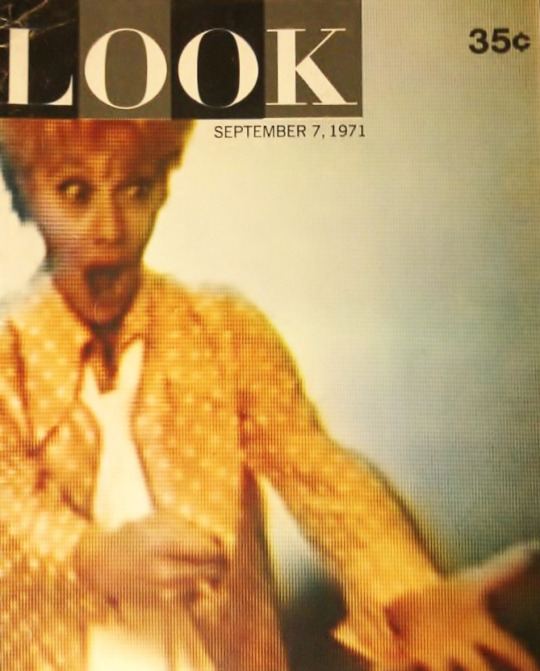
The September 7, 1971 issue of LOOK Magazine (volume 35, number 18) dedicated their entire issue to the medium of television. Inside, there is a feature titled “Lucille Ball, the Star That Never Sets...” by Laura Bergquist on page 54.
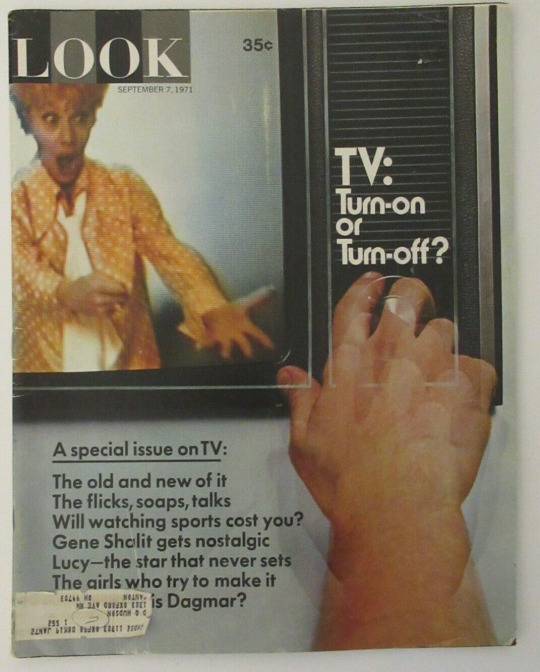
The photograph on the cover is slightly distorted to give it the look of an image through a TV screen. The shot was taken by Douglas Bergquist in January 1971.

The issue presents a variety of viewpoints about the state of television. Is it ‘tired’ or is there an infusion of new energy to take it into the new decade? John Kronenberger writes an article that asks if cable television is the future. Hindsight tells us that it was not only the future, but is now the past.

“Lucille Ball, the Star That Never Sets...” by Laura Bergquist.

Bergquist first interviewed Lucille Ball in 1956 for the Christmas issue of Look.
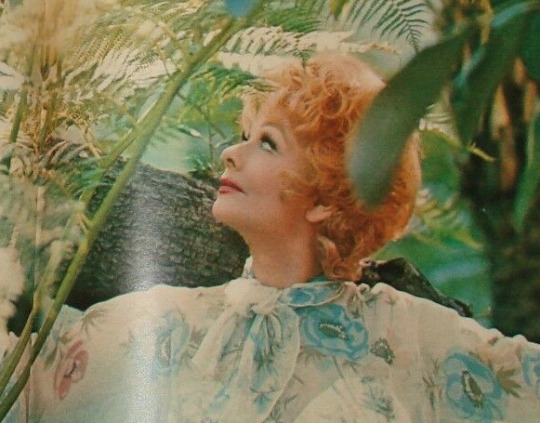
The photograph is by Douglas Kirkland, a Canadian-born photographer, who not coincidentally, also took the photograph used on the cover. This shot was taken in the garden of Ball’s home in June 1971. At age 24, Kirkland was hired as a staff photographer for Look magazine and became famous for his 1961 photos of Marilyn Monroe taken for Look's 25th anniversary issue. He later joined the staff of Life magazine.
Bergquist launches the article talking about her friend Sally, who is besot with watching Lucille Ball reruns, preferring Lucy over the news. Under the headline, she sums up the purpose of her interview: “Sorry, Sally. But Lucy is a serious, unfunny lady. So how come she’s a top clown of the fickle tube for twenty years, seen at home 11 times weekly and in 77 countries?”
LUCILLE BALL: THE STAR THAT NEVER SETS...
(Lucille Ball’s quotes are in BOLD. Footnote numbers are in parentheses.)
My neighbor Sally, nine, turns out to be a real Lucy freak. Though she likes vintage-house-wife I Love Lucy best, she'll watch Lucille Ball 11 times a week, if permitted. That's how often Madame Comedy Champ of the Tube, come 20 years this October, can be caught on my local box. Ten reruns, plus the current Here's Lucy on Monday night, CBS prime time. Friends, that's 330 weekly minutes of Lucy, which should be rank overexposure. Did you know that even the U.S. man-on-the-moon walkers slipped in ratings, second time around?
Quel mystery. Variety last fall announced that old-fashioned sitcoms and broad slapstick comedy are passé, given today's hip audiences. With one big exception - Lucy. When the third Lucy format went on in '68, reincarnating Miss Ball as a widowed secretary (with her real-life son, Desi Jr., now 18, and Lucie Jr., 20), Women's Wear Daily said not only were the kids no talent, but the show was "treacle." "One giant marshmallow," quoth the Hollywood Reporter, "impeccably professional, violence-free, non-controversial . . . 100% escapism."
Miss Ball: "Listen, that's a good review. I usually get OK personal notices, but the show gets knocked regular."
So why does Sally, like all the kids on my block, love slapstick, non-relevant Lucy? "Because she's always scheming and getting into trouble like I do, and then wriggling her way out of it." A 44-year-old Long Island housewife: "Of course I watch. I should watch the news?" When the British Royal Family finally unbent for a TV documentary, what was the tribe watching come box-time? Lucy, over protests from Prince Philip. (1)
"I've been a baby-sitter for three generations," says Miss Ball briskly. "Kids watch me during the day [she outpulls most kiddy shows]. Women and older men at night. Teen-agers, no. They look at Mod Squad. Intellectuals, they read books or listen to records.... You know I even get fan mail from China?" MAINLAND CHINA? "Hong Kong, isn't that China?" No. "Where is it anyway?"
The Statistics on the Lucy Industry are numbing. In recent years, she has run in 77 countries abroad, including the rich sheikhdom of Kuwait, and Japan, where, dubbed in Japanese yet, she's been a long-distance runner for 12 years. Where are all those funny people of yesteryear - Jackie Gleason, the Smothers Brothers, Sid Caesar, the Beverly Hillbillies - old reliables like Ed Sullivan, Red Skelton? Gone, all gone, form the live tube - except for reruns dumped by sponsors, out of fashion, murdered in the ratings.
Even this interview is a rerun. Fifteen years ago, I sat in Miss Ball's old-timey movie-star mansion in Beverly Hills, wondering how much longer, oh Lord, could Lucy last? She has a different husband, a genial stand-up comic of the fast-gag Milton Berle school, Bronx-born Gary Morton, 49. He replaced Desi Arnaz, her volatile Cuban spouse (and costar and partner) of 20 years, who lives quietly in Mexico's Baja California, alongside a pool shaped like a guitar, with a second redhead wife. "Ever been here before?" asks Gary, now her executive producer, who's brightened the house decor. "Used to be funeral-parlor gray, right?"
Otherwise, the lady, like her show, seems preserved in amber. Though newly 60, she could be Sally's great-grandmother. Of a Saturday, she's unwinding from a murderous four-day workweek. Her pink-orange-fireball hair is up in rollers. Her black-and-blue Rolls-Royce, inherited from her friend, the late Hedda Hopper, is parked in the driveway. But in attitude and opinion, she comes across Madame Middle America, despite the shrewd show-biz exterior. Good egg. Believer in hard work, discipline, Norman Vincent Peale. Deadeye Dickstraight, she talks astonishingly unfunny - about Vietnam, Women's Lib, about which she feels dimly, marriage to Latins, books she toted up to her new condominium hideaway in Snowmass, Colo. "Snow" is her new-old passion, a throwback to her small-town Eastern childhood. For the first time in family memory, this lifelong workhorse actually relaxed in that 9,700-foot altitude for four months this year, learning to ski, reading Pepys, Thoreau, Shirley MacLaine's autobiography, "37 goddamned scripts, and all those Irvings" (Stone, Wallace, etc.). She had scouted for a mountain retreat far away from any gambling. Why? Is she against gambling? "No, I'm a sucker. I can't stay away from the tables."
From yellowing notes, I reel off an analysis by an early scriptwriter. Perhaps she comes by her comic genius because of some "early maladjustment in life, so you see commonplace things as unusual? To get even, to cover the hurt, you play back the unhappy as funny?"
Forget any deep-dish theorizing. "Listen, honey," says Miss B, drilling me with those big blue peepers, "you've been talking to me for four, five hours. Have you heard me say anything funny? I tell you I don't think funny. That's the difference between a wit and a comedian. My daughter Lucie thinks funny. So does Steve Allen, Buddy Hackett, Betty Grable."
BETTY GRABLE THINKS FUNNY? "Yeah. Dean Martin has a curly mind. oh, I can tell a funny story about something that happened to me. But I'm more of a hardworking hack with an instinct for timing, who knows the mechanics of comedy. I picked it up by osmosis, on radio and movie lots [she made 75 flicks] working with Bob Hope, Bert Lahr, the Marx Brothers, the Three Stooges - didn't learn a thing from them except when to duck. Buster Keaton taught me about props. OK, I'm waiting."
Well, I hedge, I caught Miss Ball in a few funny capers on the Universal lot this week. Like one day, in her star bungalow, she throws a quick-energy lunch in the blender - four almonds, wild honey, water, six-year-old Korean ginseng roots, plus her own medicine, liver extract. "AAAGH," she gags, then peers in the mirror at her hair, which is a normal working fright wig, "Gawd," she moans, "it looks as if I'd poked my finger into an electric-light socket!" No boffo line, but her pantomimed horror makes me laugh out loud. Working, she is fearless - dangling from high wires, coping with wild beasts. She talks of animals she's worked with, chimps, bears, lions, tigers. "I love 'em all, especially the chimps, but you can't trust their fright or panic. Like that baby elephant who gave a press job to a guest actress." (2) What's a press job? "Honey, once an elephant puts his head down, he keeps marching, right through walls." Miss Ball puts her own head down, crooks an arm for a trunk, and voila, is an elephant. Funny as hell. So off-camera she's no great wit, but then is Chaplin?
Four days a week, through the Thursday night filming before a live audience, she labors like some hungry Depression starlet. Monday a.m., she sits at the head of a conference table, lined by 12 staffers, editing the script. Madame Executive Tycoon in charge of everything, overseeing things Desi used to do. Also the haus-frau, constantly opening windows for fresh air and emptying ashtrays. She wears black horn-rims, three packs of ciggies are at the ready. "Do I have to ask for a raise again?" she impatiently drills the writers, "I've done that 400 times." "QUIET!" she yells during rehearsal, perching in a high director's chair, a la Cecil B. DeMille. "Isn't somebody around here supposed to yell quiet?" She frets about the new set. "Those aisles - they're a mile and a half wide. What for?" The audience is too far away, she won't get the feedback from their laughs are her life's blood. (Once I hear Gary Morton on the phone, in his British-antiqued executive office, saying: "We need your laugh, honey. Go down to the set and laugh; that's an order.")
That physical quality about her comedy, a la the old silent movies or vaudeville - which were the big amusements of her youth - seems to transcend any language. (A Moscow acting school, I was told, shows old Lucy clips as lessons in comic timing.) So what did she learn from that great Buster Keaton?
"At Metro, I kept being held back by show-girl-glamour typing. I always wanted to do comedy. Buster Keaton, a friend of director Eddy Sedgwick, spotted something in me when I was doing a movie called DuBarry - what the hell was the name? - and kept nagging the moguls about what I could do. Now a great forte of mine is props. He taught me all about 'em. Attention to detail, that's all it is. He was around when I went out on a vaudeville tour with Desi with a loaded prop." What's that? "Real Rube Goldberg stuff. A cello loaded with the whole act - a seat to perch on, a violin bow, a plunger, a whistle, a horn. Honey, if you noodge it, you've lost the act. Keaton taught me your prop is your jewel case. Never entrust it to a stagehand. Never let it out of your sight when you travel, rehearse with it all week." Ever noodge it? "Gawd, yes. Happened at the old Roxy in New York. I was supposed to run down that seven-mile aisle when some maniac sprang my prop by leaping out and yelling 'I'm that woman's mother! She's letting me starve.'" What did you do? "Ad-libbed it, and I am one lousy ad-libber."
After 20 years, isn't she weary of playing the Lucy character? "No, I'm a rooter, I look for ruts. My cousin Cleo [now producer of Here's Lucy] is always prodding me to move. She once said Lucy was my security blanket. Maybe. I'm not erudite in any way, like Cleo. But why should I change? Last year was big TV relevant year, and I made sure my show wasn't relevant. Lucy deals in fundamental, everyday things exaggerated, with a happy ending. She has a basic childishness that hopefully most of us never lose. That's why she cries a lot like a kid - the WAAH act - instead of getting drunk."
Aha! Is Lucy the guileful child-woman, conniving forever against male authority - whether husband or nagging boss - particularly FEMALE? ("None of us watch the show," sniffed a Women's Libber I know, "but she must be an Aunt Tom." Still, I ponder, hasn't that always been the essence of comedy, the little poor-soul man - or woman - up against the biggies?)
"I certainly hope so. You trying to con me into talking about Women's Lib? I don't know the meaning of it. I never had anything to squawk about. I don't know what they're asking for that I don't have already. Equal pay for equal work, that's OK. The suffragettes rightly pressed a hard case - and when roles like Carry Nation come along, they ask me to play them, perhaps because I have the physical vitality. But they're kind of a laughingstock, aren't they? Like that girl who gave her parents 40 whacks with an ax? Didn't Carry Nation ax things, was she a Prohibitionist or what?" (3)
She'd just said nix to playing Sabina, in the movie of Thornton Wilder's The Skin of Our Teeth. Why? "I didn't understand it." She turned down The Manchurian Candidate for the same reason. "Got that Oh Dad, Poor Dad script the same week and thought I'd gone loony." If she makes another movie, she'll play Lillian Russell in Diamond Jim with Jackie Gleason, "a nice, nostalgic courtship story that won't tax anyone's nerves." (4)
Is Miss Ball warmed by the comeback of old stars in non-taxing Broadway nostalgia shows like No, No, Nanette? (5)
"Listen, I studied that audience. I saw people in their 60's and 70's enjoying themselves. That had to be nostalgia. The 30's and 40's smiled indulgently, that Ruby Keeler is up there on the stage alive, not dead. For the below 30's, it's pure camp. I don't put it down, but it’s not warm, working nostalgia, but the feeling 'Ye gods, anything but today'
"Maybe I'm more concerned about things that I realize. I told you politics is definitely not on my agenda - I got burned bad, back in the '40's signing a damned petition as a favor. (6) Just say the word 'politician,' and I think of chicanery. Too many subversive angles today. But I must be one of millions who are so fed up, depressed, sobbing inside, about the news...the atrocities, the dead, the running down of America. You can't obliterate the news, but the baddest dream is that you feels so helpless.
"I was sitting in this very chair one night, flipping the dial, and came to Combat! There were soldiers crouching in bushes, a helicopter hovering overhead. Nothing happening, so I make like a director, yelling, 'Move it! This take is too LONG!' It turned out to be a news show from Vietnam. That shook me. There I was criticizing the director, and real blood was dripping off my screen... That drug scene bugs me. It's ridiculous, self-indulgent. We're supposed to be grateful if the kids aren't on drugs. They're destroying us from within, getting at our youth in the colleges. OK, kids have to protest, but how can they accomplish anything if they're physically shot?
"One of the reasons I'm still working is that people seem grateful that Lucy is there, the same character and unchanging view. There's so much chaos in this world, that's important. Many people, not only shut-ins, depend on the tube, too much so - they look for favorites they can count on. Older people loved Lawrence Welk. They associated his music with their youth. Now he's gone. It's not fair. (7) They shouldn't have taken off those bucolic comedies; that left a big dent in some folks' lives. Maybe we're not getting messages anymore from the clergy, the politicians, so TV does the preaching. But as an entertainer, I don't believe in messages.
"Some Mr. Jones is always asking why am I still working - as if it were some crime or neurotic. OK, I'll say it's for my kids. But I like a routine life, I like to work. I come from an old New England family in which everyone worked. My grandparents were homesteaders in New York and Ohio. My mother worked all her life - during the Depression in a factory."
What does she think of the new "relevant" comedy like All in the Family? "I don't know... It's good to bring prejudice out in the open. People do think that way, but why glorify it? Those not necessarily young may not catch the moral. That show doesn't go full circle for me."
Full circle?
"You have to suffer a little when you do wrong. That prejudiced character doesn't pay a penance. Does he ever reverse a feeling? I'm for believability, but I'm tired of hearing 'pig,' 'wop,' 'Polack' said unkindly. Me, I have to have an on-the-nose moral. Years ago, the Romans let humans be eaten by lions, while they laughed and drank - that was entertainment. But I’m tired of the ugly. Fred Astaire and Ginger Rogers dancing, that's my idea of entertainment. Anything Richard Burton does is heaven. Easy Rider scared me at first because I knew how it could influence kids. But at least that movie came full circle. They led a life of nothing and they got nothing. Doris Day, I believe in her. Elaine May? A kook, but a great talent. Barbra Streisand? A brilliant technician."
On her old ten-minute daily interview radio show, (8) she once asked Barbra, like any star-struck civilian: How does it feel to be only 21, a big recording artist and star of the Broadway hit Funny Girl? "Not much," said Barbra. "That cool really flustered Lucille. It violated everything she believes in," says cousin Cleo Smith, who grew up with Miss B in small-town Celoron, N.Y. "For her, nothing ever came easy. She didn't marry until she was 30, or become a really big star until she was 40. She's still so hard on herself, sets such rigorous standards for herself as an actress and parent. She honestly believes in all the old maxims, that a stitch in time saves nine, etc. She's literal-minded, a bit like Scarlett O'Hara. Does what needs doing today, and to hell with tomorrow."
Her self-made wealth a few years ago was reckoned at $50 to $100 million. After her divorce, she reluctantly took over the presidency of the Desilu studio and sold it six years later to the conglomerate Gulf & Western for nearly $18 million. Does that make her the biggest lady tycoon in Hollywood? (The 179 original I Love Lucy reruns now belong, incidentally, to a CBS syndicate; her second Lucy Show, to Paramount. She owns only the current Here's Lucy - OK, go that straight?)
"Hah! Like Sinatra, I owe about three and a half million bucks all the time. That figure is ridiculous. All my money is working. I lost a helluva lot in the stock market last year and haven't recouped it. It's an illusion that people in show biz are really rich. The really filthy rich are the little old ladies in Boston, the old folks in Pasadena, who've had dough for years and haven't been seen since."
The divorce from Desi Arnaz can still set her brooding. "It was the worst period of my life. I really hit the bottom of despair - anything form there on had to be up. Neither Desi nor I has been the same since, physically or mentally, though we're very friendly, ridiculously so. Nobody knows how hard I tried to make that marriage work, thinking all the trouble must be my fault. I did everything I could to right that ship, trotting to psychiatrists. I hate failure, and that divorce was a Number One failure in my eyes... Anything in excess drives me crazy. He'd build a home anyplace he was, and then never be around to enjoy it. I was so idealistic, I thought that with two beautiful babies, and a beautiful business, what more could any man want? Freedom, he said, but he had that. People don't know what a job he did building that Desilu empire, what a great director and brilliant executive he was yet he let it all go....Maybe Latins have an instinct for self-destruction..."
Was that the conflict, a Latin temperament married to an old-fashioned American female? "It has a helluva lot to do with getting into it and getting out. The charm. But they keep up a big facade and don't follow through. No, the machismo didn't bother me, I like to play games too.
"Desi and I had made an agreement that if either of us wanted to pull out of Desilu, the other could buy. I wanted to go to Switzerland with the kids, anywhere to run away, but he wanted out. The I found out that for five years, our empire had taken a nose dive, and if I wanted to get my money back, I had to rebuild it first. For the first time in my life, I was absolutely terrified - I'd never run any show or a big studio. When I came back from doing the musical Wildcat on Broadway, I was so sick, so beat, I just sat in that backyard, numb, for a year. I'd had pneumonia, mononucleosis, staph, osteomyletis. Lost 22 pounds. Friends told me the best thing I could do physically, psychologically, was go back to work, but could I revive Lucy without Desi, my old writers, the old crew?"
You didn't like being a woman executive? "I hated it. I used to cry so much - and I'm not a crier - because I had to let someone go or make decisions I didn't understand. There were always two sides to every question, and trouble was I could see both sides. No one realizes how run-down Desilu was. The finks and sycophants making $70,000 a year, they were easy to clean out. Then during the CBS Jim Aubrey regime, I couldn't sell the new pilots we made - Dan Dailey, Donald O'Connor, Ethel Merman. I couldn't sell anything but me." (9)
Was it tough to be a woman bossing men? "Yeah. It puts men in a bad spot. I could read their minds, unfortunately, wondering who is this female making this decision, not realizing that maybe I'd consulted six experts first. I'm all wrong as an executive, I feel out of place. I have too many antennae out, I'm too easily hurt and intimidated. But I can make quick surgical incisions. I've learned that much about authority - give people enough rope to hand themselves, stand back, let them work, but warm them first. Creative people you have to give special leeway to, and often it doesn't pay off. Me, I'm workative, not creative. I can fix - what I call 'naturalize.' I'm a good editor, I can naturalize dialogue, find an easier way to do a show mechanically.
But I didn't make the same marriage mistake twice. Gary digs what my life is, why I have to work. We have tranquility. We want the same things, take care of what we have."
She shows me Gary's dressing room, closets hung with shirts and jackets - by the dozen. "My husband is a clothes and car nut, but it's a harmless vice. Better than booze or chasing women, right?" (His cars include a 1927 Model T Ford, a Mercedes-Benz 300 SL, an Astin Martin, a Rolls-Royce convertible.)
"Anyone married to me has an uphill climb. Gary and I coped by anticipating. We knew we should be separated eight, nine months a year, so he tapered off his act, found other thing to do - making investments, building things. He plays the golf circuit, Palm Springs, Pebble Beach, and tolerantly lets me stay at Snowmass for weeks. Sun just doesn't agree with me. He didn't come into the business for five years. I didn't want to put him in a position in which he would be ridiculed. I could tell that he was grasping things - casting, story line. I said, 'You've been a big help to me. You should be paid for it.' "
On a Friday night, I dine with the Mortons. Dinner is served around 6:30, just like in my Midwest hometown. Lucille is still fretting about this week's show - "over-rehearsed; because there were so many props, the fun had gone out of it." Gary, just home from unwinding his own way - golfing with Milton Berle, Joey Bishop - asks if I'd like something to drink with dinner? Coke or ginger ale? "No? I think we have wine." No high living in this house, but the spareribs are superb. "Laura asked me an interesting question," he tells his wife. "Like isn't there a conflict when a husband in the same business - comedy - marries a superstar? I told her I'd never thought of it before."
They met the summer when Lucille was rehearsing Wildcat, and he was a stand-up comic at Radio City Music Hall, seven days a week. "We both came up the hard way," he says. "I got started in World War II, clowning for USO shows. I've been in show biz for 30 years and can appreciate what she goes through. Lucy can't run company by herself. Maybe with me around, when she walks on the set, her mind is at peace. I pop in from time to time, on conferences, rehearsals. I can tell from her if things are going well, if the laughter is there. She's a thoroughbred, very honest with me, a friend to whom I can talk about anything. She never leaves me out of her life; that's important for a man. Do you know how many bets were lost about our marriage lasting? It's been nearly ten years now, and I've slept on the couch only once."
Past dinner, we adjourn promptly to the living room, and a private showing of Little Murders. It's not a pretty movie of urban American life, and Lucy talks back indignantly to the screen. (10) The flick she rally like was George Plimpton's Paper Lion, with the Detroit Lions, which she booked under the illusion it was an animal picture. "At the end, 12 of us here stood up and cheered, and I wrote every last Lion a fan note. You know that picture hardly made a dime?"
On a house tout, I'd noted the Norman Rockwell and Andrew Wyeth albums in the living room, and a memo scotch-taped to her bathroom wall: "Get Smart with N.V.P."
N.V.P. Is that Norman Vincent Peale, her old friend and spiritual mentor? "Yes. He marred me and Gary. I still adhere to his way of thinking because he preaches a day-to-day religion that I can understand. Something workable, not allegory. Like how do you get up in the morning and just get through the day?
"Dr. Peale taught me the art of selfishness. All it means is doing what's right for you, not being a burden to others. When I was in Wildcat, he dropped around one night saying, 'I hear you're very ill, and working too hard.' 'Work never hurt anybody,' I protested. But he reminded me I had two beautiful children to bring up, and if I was in bad shape, how could I do it? I've learned you don't rake more leaves than you can get into the wheelbarrow. I've always been moderate, but I was too spread around, trying to please too many people. You don't become callous, but you conserve your energies."
What about her kids? Passing a newsstand, I'd noted a rash of fan mags blazoned with headlines about Desi Jr., something of a teen-age idol, and at 18 a spitting image of old pop. (A rock star at 12, he'd recently garnered very good notices indeed for a movie role in Red Sky at Morning.) "Why Lucille Ball's Son Is So Bitter About His Own Mother," read the El Trasho covers. "Patty Duke Begs Desi Jr. To Believe Her: 'You Made Me Pregnant.' " Does the imbroglio bother this on-the-nose moralist?
"I worked for years for a quiet personal life and to have to personally impinged on, with no recourse, is hard. I brought Patty to the house, feeling very maternal about her, saying look at this clever girl, what a big talent she is. Now, I can thank her for useless notoriety. She's living in some fantastic dreamworld, and we're the victims of it. Desi being the tender age of 17 when they met, she used him. She hasn't proved or asked for anything. I asked Desi if he wanted to marry her and he said no. My daughter helped outfit the baby, which Patty brought to the house, but did she ever say thank you?
"Desi's going to CIA this fall." Not the CIA? No, the new California Institute of the Arts, where he'll study music. "Yes, he's very much like his father, too much sometimes - I just hope he has Desi's business acumen. I'm glad he didn't choose UCLA or Berkeley or a school full of nonconformists. Lucie just now wants marriage and babies - maybe she'll go on to college later.
"I took the kids out of school deliberately. Desi was at Beverly Hills High, Lucie at Immaculate Heart."
Why? "I didn't like the scene - it was the usual - pregnant girls, drugs." That goes on at Immaculate Heart? Sure. "A lot of girls who boarded there were unhappy misfits, and Lucie was already working in the nunnery. All the friends she brought home were the rejected. I'm that way myself."
Did they mind, well, your stage-managing their lives? "No, they were as sick of that weird high school scene as I was. I made them a proposition - told them to think it over for a month, while I was in Monaco. Do you want to be on the show? I told them the salary would be scale, that most would be put in trust. They'd be tutored and not able to graduate with their classes. They both thought they were going to the coast, but working with a tutor, they really got turned on by books for the first time. They wanted to be in show business, and I wanted to keep an eye on them."
Of course her show is nepotism, she grants. "Cleo thought a long time before becoming the producer, wondering if it wasn’t overdoing family. Nobody seems to be suffering from it, I told her." Thursday night show time is like a tense Broadway opening night. Gary Morton, in stylish crested blazer, warms up the audience, heavy with out-of-town tourists. "Lucy started out with another fellow, can't remember his name.... What is home without a mother? A place to bring girls." Lucille bursts out onstage, exuding the old MGM glamour, fireball hair ablaze, eyelashes inches long, in aquamarine-cum-rhinestone kaftan. "For God's sake," she implores, "laugh it up! We want to hear from you... Gary, have you introduced my mom?" Indeed he has. Loyal, durable, 79-year-old Desiree "DeDe" Ball, her hair pink as Lucille's, has missed few of the 409 Lucy shows filmed to date, and is on hand as usual with 19 personal guests. Gary also asks for big hands for Cleo, and her husband Cecil Smith, TV critic for the LA Times, who has also appeared on the show. (11)
One day Desi Jr. wanders on the set, just back from visiting his father in Mexico. He'd gone with Patty Duke and the baby. The young man does have Latin charm, and apparently talent. I ask him a fan-mag query: Is it rough to be the spin-off of such famous show-biz parents?
"Well, I grew up with kids like Dean Martin, Jr., and Tony Martin, Jr., and we had a lot in common." What? "We all had houses in Palm Springs." Any generational problem with Mom? "She's found the thing she's best at, and sticks to it. As long as she has Snowmass, she has an escape, some reality. I realize she lives half in a man's world, and that must be tough on a woman. My father - he worked hard for years, and then he'd had it. This is silly, weird, he felt. He aged more in ten years than he had in 40. I'm like him. I feel life is very short. He's had major operations recently, and he's changed a lot."
Patty Duke is six years older than Desi Jr., paralleling the six-year age gap that separated parents Lucy and Desi. "Patty is a lot like my mother, the same drive, and strong will, a perfectionist...But I'm never going to get married. Marriage is unrealistic, expecting you to devote a whole life unselfishly to just one person. Do you know people age unbelievably when they marry? From what I've seen, 85 percent of married couples are miserable; 14 percent, just average; one percent, happy." (12)
His mother's own childhood, in little Celoron, an outspring of Jamestown, N.Y., was oh-so-different from her kids'. "She was always a wild, tempestuous, exciting child," say Cleo, "doing things that worried people, plotting and scheming, though she knew she'd get in trouble." Interesting, because that's one basic of the Lucy format, Miss B forever finagling second bananas like Vivian Vance into co-trouble. "One summer, she conned me into running away. It was only to nearby Fredonia, but in her sneaky way she really wanted to catch up to a groovy high school principal who was teaching there. He played it very cool, calling Mom and telling her we were staying overnight in a boarding house. On his advice, when we got home, DeDe acted as if we hadn't been away. That devastated Lucille, no reaction, nothing."
The classic Lucy story line also has her conniving against male authority, whether husband or boss, now played by Gale Gordon. "I need a strong father or husband figure as catalyst. I have to be an inadequate somebody, because I don't want the authority for Lucy. Every damned movie script sent me seems to cast me as a lady with authority, like Eve Arden or Roz Russell, but that's not me.
"No, I don't remember my own father," says Miss Ball. "He was a telephone lineman who died of typhoid at 25, when I was about three. I do remember everything that day, though. Hanging out the window, begging to play with the kids next door who had measles... The doctor coming, my mother weeping. I remember a bird that flew in the window, a picture that fell off the wall.
"My brother Fred [who was born after her father's death] was always very, very good. He never did anything wrong - he was too much to bear. I was always in trouble, a real pain in the ass. I suppose I wasn't much fun to be around." To this day, says Cleo, Lucille suspects Fred is her mother's favorite, even though DeDe has devoted her whole life to this daughter.
Family ties were always fierce-strong. After her father's death, "We lived with my mother's parents, for a while. Grandpa Hunt was a marvelous jack-of-all-trades, a woodturner, eye doctor, mailman, bon vivant, hotel owner. [And also an old-fashioned Populist-Socialist.] He met my grandmother, Flora Belle, a real pioneer woman and pillar of the family, when she was a maid in his hotel. She was a nurse and midwife, an orphan who brought up four pairs of twin sisters and brothers all by herself. He took us to vaudeville every Saturday and to the local amusement park. When Grandma died at 51, all us kids had to pitch in, making beds, cooking.
"Yeah, I guess I am real mid-America, growing up as a mix of French-Scotch-Irish-English, living on credit like everyone else, paying $1.25 a week to the insurance man, buying furniture on time. But it was a good, full life. Grandpa took us camping, fishing, picking mushrooms, made us bobsleds. We always had goodies. I had the first boyish bob in town and the first open galoshes.
"My mother then married Ed Peterson, a handsome-ugly man, very well-read. He was good to me and Freddy but he drank too much. He was the first to point out the magic of the stage. A monologist came to town on the Chautauqua circuit. He just sat onstage with a pitcher of water and light bulb and made us laugh and cry for two hours. For me, this was pure magic. When I was about seven, Ed and mother moved to Detroit, leaving me with his old-fashioned Swedish parents, who were very strict. I had to be in bed at 6:30, hearing all the other kids playing outside in the summer daylight. Maybe it wasn't that traumatic, but I realize now it was a bad time for me. I felt as if I'd been deserted. I got my imagination to working, and read trillions of books."
The adult Lucille, talking to interviewers, used to go on and on about her "unhappy" childhood, little realizing that she was reflecting on her mother, to whom she is passionately devoted. "Just how long do you think you lived with the Petersons?" asked DeDe one day in a confrontation. "Three YEARS? Well I tell you it was more like three weeks."
"I left home at 15, much too early, desperate to break into the big wide world. Looking for work in New York show biz was ugly, without any leads or friends or training other than high school operettas and plays and Sunday school pageants. I was very shy and reticent, believe it or not, and I kept running home every five minutes. I got thrown in with older Shubert and Ziegfeld dollies and, believe me, they were a mean, closed corporation. I don't understand kids today who get easily discouraged and yap about doing their own thing. Don't they know what hard work is? Where are their morals? I always knew when I did wrong, and paid penance."
Yet she was venturesome enough to sit in on some recent Synanon group-therapy sessions for drug addicts. "They wanted me to raise some money, and I wanted to find out what it was about. The games were fascinating, wonderful, until I couldn't take it any more. The other participants kept bugging me: What are you here for? Are your children drug addicts? I had to start making up problems."
For two decades, she's been risking her neck in those murderous ratings, outlasting long-ago competitors like Fulton Sheen, and now up against such pleasers as pro football and Rowan and Martin. (13)
Suppose the ratings drop, what would she do?
No idea. "Might take a trip on the Inland Waterway form Boston to Florida. In my deal with Universal, I can make specials, other movies, TV pilots. I wouldn't have to ski 'spooked' at Snowmass." What's that? "Honey, I have to be careful. If I break a leg 500 people are out of work. (14) I'd be happy in some branch of acting with some modicum of appreciation. Listen, it never occurred to me, in life that I'd fail ever, because I always appreciated small successes. I never had a big fixed goal. When I was running Desilu, it drove me wild when people asked, 'Aren't you proud to own the old RKO studio where you once worked as a starlet?' What $50-a-week starlet ever walked around a lot saying, 'I want to own this studio'?
"I don't know what you've been driving at, what's your story line? But it's been interesting, talking."
FOOTNOTES: HINDSIGHT IS 20/20
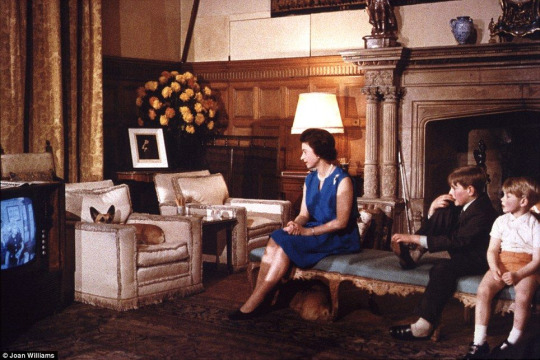
(1) This refers to a rare 1969 BBC documentary about Britain’s royal family that gave the public an inside look at the life of the Windsors. In one scene, the family was watching television, and on the screen was “I Love Lucy”, much to the chagrin of Prince Philip. Queen Elizabeth and Prince Philip were mentioned on the series, especially in the episode “Lucy Meets the Queen” (ILL S5;E15).
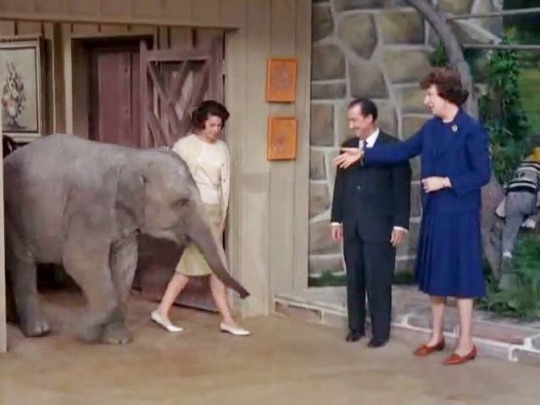
(2) Lucy is referring to a 1967 episode of “The Lucy Show” titled “Lucy The Babysitter” (TLS S5;E16) in which Lucy Carmichael babysits three rambunctious chimps for their parents, played by Jonathan Hole and Mary Wickes. In the final moments of the show, Wickes reveals a fourth sibling - a baby elephant! The animal went wild and pushed Wickes (what Ball described as a “press job”) into one of the prop trees. The trainer had to physically subdue the elephant to get it away from Wickes, who injured her arm. The final cut ends with the entrance of the baby elephant.

(3) Lucy is conflating (probably intentionally) the stories of real-life prohibitionist Carrie Nation (1846-1911), who famously hacked up bars and whisky barrels with an axe, and Lizzie Bordon (1860-1927), who famously hacked up her parents with an axe. (Photo from the 1962 TV special “The Good Years” starring Lucille Ball and Henry Fonda.)

(4) There was never a film version of Thornton Wilder’s play Skin Of Our Teeth which was on Broadway in 1942 starring Tallulah Bankhead as Sabina, the role offered to Ball. There were several television adaptations; one in Australia in 1959; one in England the same year starring Vivian Leigh as Sabina; one in the USA in 1955 starring Mary Martin (above) as Sabina; and a filmed version of a stage production starring Blair Brown as Sabina in 1983. Although it is possible that Lucille Ball might have been considered for the role of the sexy housemaid Sabina in 1955, the article says that the role was “just” offered to her, so it probably refers to a 1971 project that never materialized. Wilder’s story tracks a typical American family from New Jersey from the ice age through the apocalypse.

(5) In 1971, there was a popular revival of the 1925 musical comedy No, No, Nanette on Broadway. The cast featured veteran screen star Ruby Keeler and included Helen Gallagher (playing a character named Lucille, coincidentally), Bobby Van, Jack Gilford, Patsy Kelly and Susan Watson. Busby Berkeley, nearing the end of his career, was credited as supervising the production, although his name was his primary contribution to the show. The 1971 production was well-reviewed and ran for 861 performances. It sparked interest in the revival of similar musicals from the 1920s and 1930s. The original 1925 cast featured Charles Winninger, who played Barney Kurtz, Fred’s old vaudeville partner on “I Love Lucy.” In that same episode (above), they sing a song from the musical, "Peach on the Beach” by Vincent Youmans and Otto Harbach. Like the revue in the episode, the musical is set in Atlantic City, New Jersey.
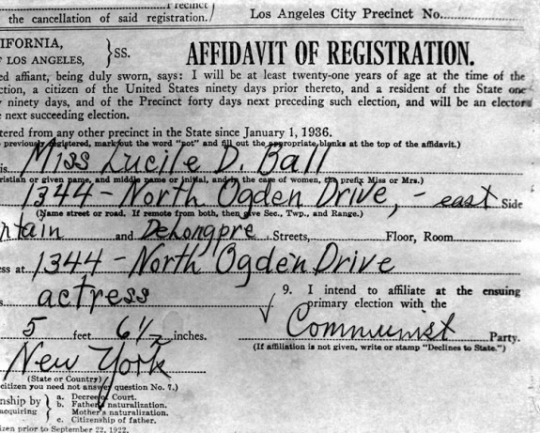
(6) Lucy is referring to her 1936 affidavit of registration to join the Communist Party. Lucille said she signed it to appease her elderly grandfather. The cavalier act caught up with Ball in 1953, when zealous red-hunting Senator Joe McCarthy tried to purge America of suspected Communists. Although many careers were ruined, Ball escaped virtually unscathed.
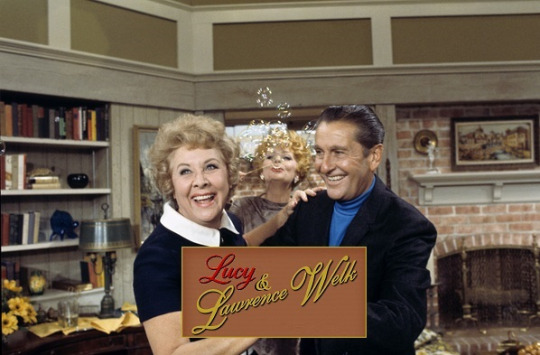
(7) The popular big band music series “The Lawrence Welk Show” (1955) was unceremoniously canceled in 1971 by ABC, in an attempt to attract younger audiences. What Lucy doesn’t mention is that four days after this magazine was published, the show began running brand new shows in syndication, which continued until 1982. Welk, despite not being much of an actor, played himself on “Here’s Lucy” (above) in January 1970.
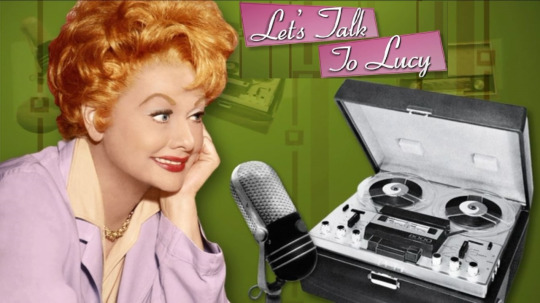
(8) “Let’s Talk To Lucy” was a short daily radio program aired on CBS Radio from September 1964 to June 1964. Most interviews (including Streisand’s) were spread over multiple installments.

(9) To showcase possible new series (pilots) Desilu and CBS aired “Vacation Playhouse” (1963-67) during the summer when “The Lucy Show” was on hiatus. This would often be the only airing of Lucy’s passion projects. “Papa GI” with Dan Dailey as an army sergeant in Korea who has his hands full with two orphans who want him to adopt them. The pilot was aired in June 1964 but it was not picked up for production. “Maggie Brown” had Ethel Merman playing a widow trying to raise a daughter and run a nightclub which is next to a Marine Corps base. The pilot aired in September 1963, but went unsold. “The Hoofer” starring Donald O’Connor and Soupy Sales as former vaudevillians aired its pilot in August 1966. No sale!

(10) Little Murders (1971) was a black comedy based on the play of the same name by Jules Feiffer. The film is about a young nihilistic New Yorker (Elliott Gould) coping with pervasive urban violence, obscene phone calls, rusty water pipes, electrical blackouts, paranoia and ethnic-racial conflict during a typical summer of the 1970s. Definitely not Lucille Ball’s style of comedy! Paper Lion (1968) was a sports comedy about George Plimpton (Alan Alda) pretending to be a member of the Detroit Lions football team for a Sports Illustrated article.
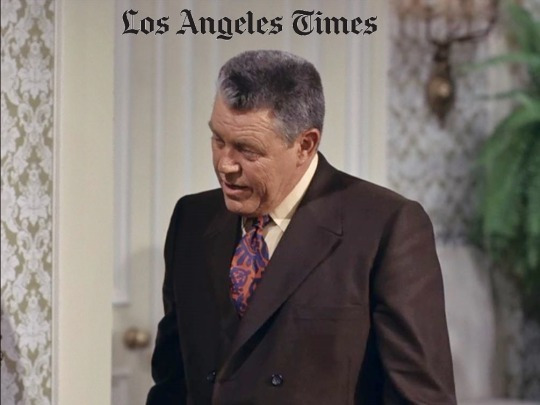
(11) Cecil Smith appeared in “Lucy Meets the Burtons” (HL S3;E1) in 1970 playing himself, a member of the Hollywood Press with a dozen other real-life writers. The casting was a way to get better coverage of the episode (featuring power couple Dick Burton, Liz Taylor, and her remarkable diamond ring). The gambit worked and the episode was the most viewed of the entire series.

(12) Desi Jr.’s 1971 views on marriage did not last. He married actress Linda Purl in 1980, but they divorced in 1981. In October 1987, Arnaz married dancer Amy Laura Bargiel. Ten years later they purchased the Boulder Theatre in Boulder City, Nevada and restored it. They lived in Boulder with their daughter, Haley. Amy died of cancer in 2015, at the age of 63.
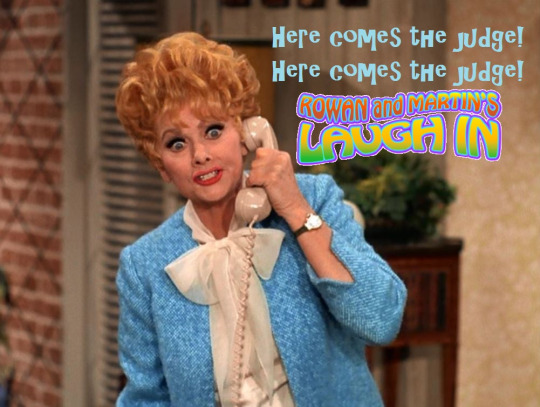
(13) From 1952 to 1957, Catholic Bishop Fulton J. Sheen hosted the inspirational program “Life Is Worth Living”, winning an Emmy Award in 1953, alongside winners Lucille Ball and “I Love Lucy.” “Here’s Lucy” was programmed up against “Monday Night Football” on ABC and “Rowan and Martin’s Laugh-In” on NBC. Instead of ignoring her competition, Ball embraced them by featuring stories about football and incorporating many of the catch phrases and guest stars from “Laugh-In.”

(14) Lucy spoke too soon! Just a few months after this interview was published Ball did indeed have a skiing accident in Snowmass and broke her leg. With season five’s first shooting date approaching, Ball was faced with either ending the series or re-write the scripts so that Lucy Carter would be in a leg cast. She chose the latter, even incorporating actual footage of herself on the Snowmass slopes (above) into "Lucy’s Big Break” (HL S5;E1).

Elsewhere in the Issue...
“This Was Our Life” by Gene Shalit includes images of Lucille Ball in the collage illustration.
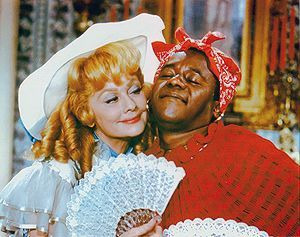
A week after this issue of Look hit the stands, the fourth season of “Here’s Lucy” kicked off with guest star Flip Wilson and a parody of Gone With the Wind. Three days later, Ball guest-starred on his show.

Not to be outdone, LOOK’s rival LIFE also devoted an entire issue to television, on news stands just three days later.
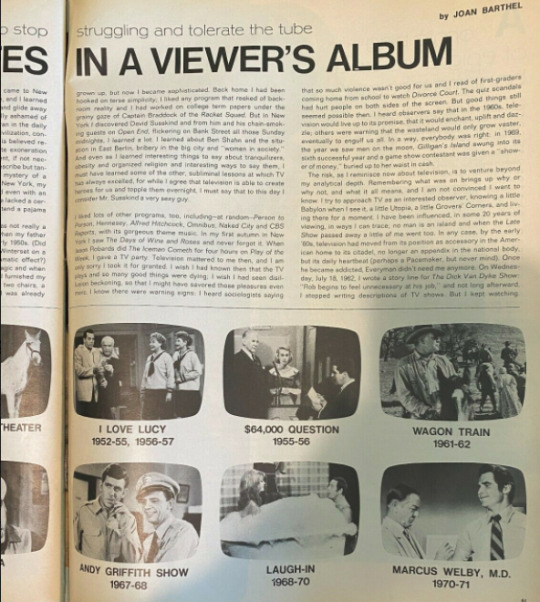
Naturally, “I Love Lucy” didn’t escape mention! I’m not sure why the show’s run is bifurcated: 1952-55, 1956-57. Actually, the show began in 1951 and ran continually until 1957.

Click here for more about Look, Life and Time!
#Look Magazine#1971#Lucille Ball#Here's Lucy#Lucy#Laura Bergquist#Douglas Kirkland#Desi Arnaz Jr.#Cleo Smith#Cecil Smith#Little Murders#Flip Wilson#Snowmass#Lawrence Welk#Let's Talk To Lucy#Mary Martin#Skin of Our Teeth#I Love Lucy#No No Nanette#The Good Years#The Lucy Show#Mary Wickes#Royal Family#Paper Lion#Television#TV Guide
7 notes
·
View notes
Text
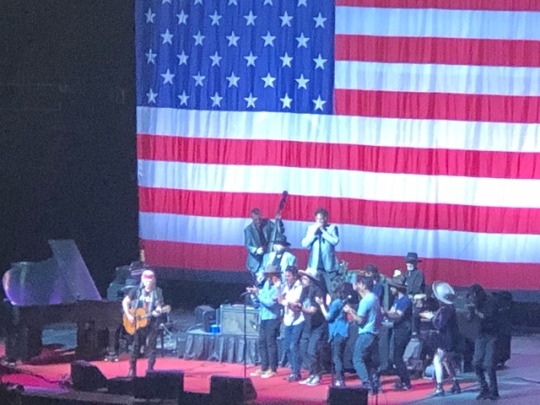
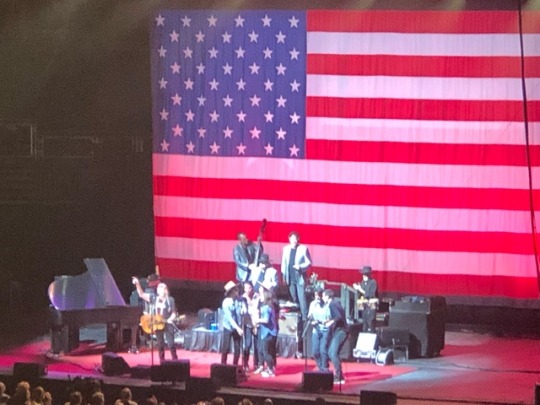

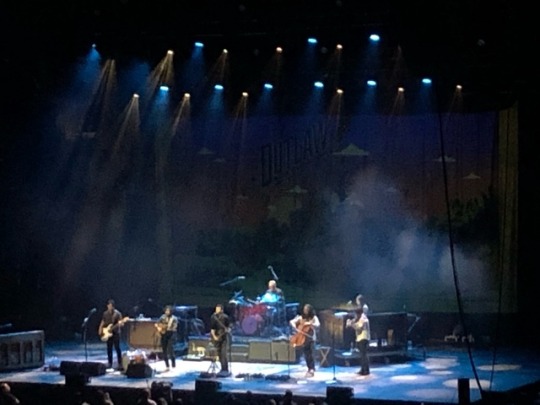

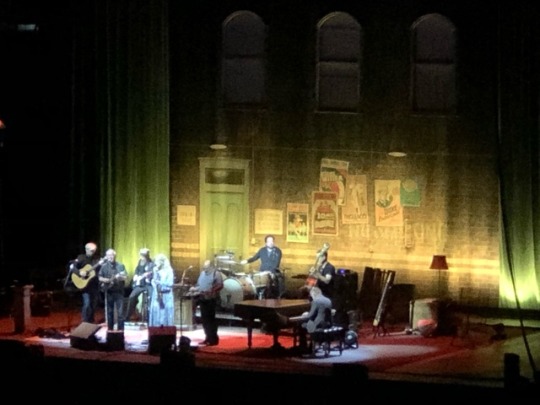
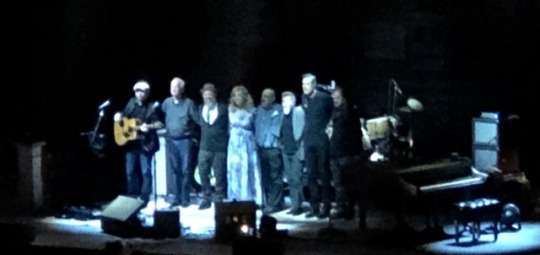
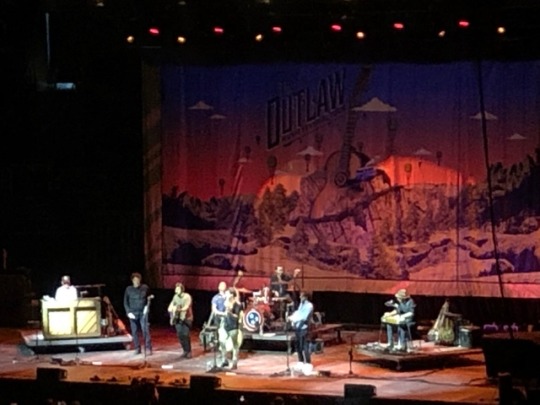
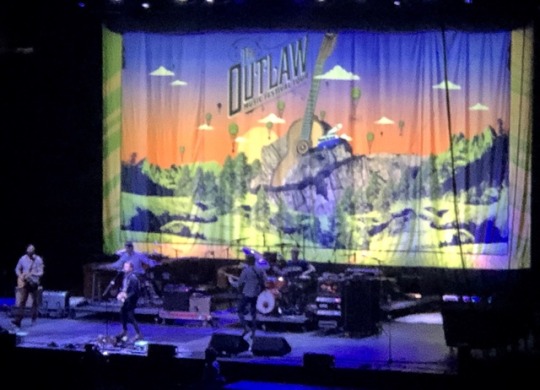
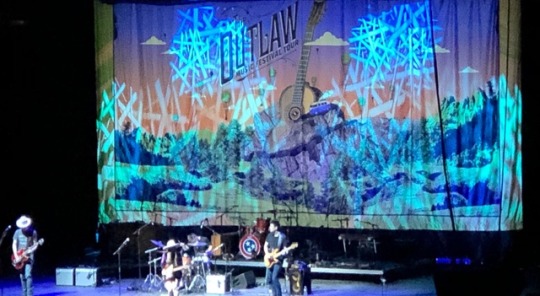
Outlaw Music Festival at Nationwide Arena, Columbus, Ohio, June 23, 2019
Willie Nelson had a really good Sunday night in Columbus.
Closing his Outlaw Music Festival inside Nationwide Arena shortly before 11 p.m., Nelson and his band - aptly named Family - were joined by members of Old Crow Medicine Show, the Avett Brothers and others who'd played before to sing along on the usual set-closing twofer of "Will the Circle Be Unbroken" and "I'll Fly Away." But when the joyous spiritual numbers ended and the guests dashed off stage, Nelson surprised everyone by saying he had a request to fill and played "Georgia on My Mind." He followed that with "Roll Me up and Smoke Me When I Die" and then reprised "Circle"->"Away" before walking off as the Family vamped in front of a huge American flag that fell over the Texan banner that had been there the entire set.
With son Lukas in Europe promoting the new Promise of the Real LP and backing Neil Young on select dates, Nelson was left to play all the guitar parts himself and he and Trigger stepped up with nuanced solos on Tom T. Hall's "Shoeshine Man" and Django Reinhardt's "Nuages." Nelson also mixed up his usual setlist - which still included "Whiskey River," "On the Road Again" and "Always on My Mind" (but not "Crazy" or "Nightlife") - by tossing in three tracks from the just-released Ride Me Back Home including Guy Clark's tender "My Favorite Picture of You" and Mac Davis' irreverent "It's Hard to be Humble."
Nelson is 86, pianist and "Little Sister" Bobbie - who, as always, shone on "Down Yonder" - is 88 and drummer Paul English has been playing with Nelson since 1955, so it's understandable that some nights may be better than others. On Sunday, Nelson - in good voice and full of pep as he whipped red bandanas into the first few rows - and his crew packed more than 20 songs into an energetic, 65-minute set that was as good as anyone seeing him in 2019 and beyond should be lucky to experience.
The Avett Brothers immediately preceded the headliner with an infectious, 70-minute performance that featured OCMS' Ketch Secor on fiddle for the whole shebang and a guest appearance from Nelson's harp man extraordinaire Mickey Raphael on "The Race is On." As is usually the case with this group of musicians, the set spanned genres and subject matter from the outlandish rock 'n' roll of "Satan Pulls the Strings" to the drums-and-bass celebration of self-worth, “Ain't No Man," to the modern spiritual that is "No Hard Feelings," a track that most bands could build a career on.
But the Avett Brothers - who may be the only band that can head bang with banjo, upright bass, acoustic guitar and cello - have so much more to offer. And they did as Seth and Scott and bassist Bob Crawford slowed things down to sing "I Wish I Was" acoustically around a single mic before leaving Scott for a solo-acoustic rendition of "Murder in the City," no small feat to pull off in a 20,000-seat arena. Mostly, though, the band filled the cavernous space with an engaging - but not intrusive - light show, obvious onstage joy and interaction and blood-kin harmonies that combine in an eclectic mix of Americana that make this band among the best live bands in the country on any given night.
On this night, however, Alison Krauss stole the show with a 70-minute performance sandwiched between the Avetts and the Crows. Eschewing the Outlaw backdrop that adored the stage for most of the eight-hour gig, Krauss and her solo band - which includes Union Station's Ron Block and Barry Bales - played before a streetscape and stuffed the concert with more genres than seemed possible from the balladic opening of Roger Miller's "River in the Rain" to the a cappella gospel of "Down to the River to Pray" to the rockabilly of "It's Goodbye and So Long to You" to the torchy, vocal-jazz tip of the cowboy hat to Nelson that was "Angel Flying too Close to the Ground."
Still possessing a voice that could make a financial statement sound stunning if sung, Krauss put it to work with a quick, voices-only reading of "Go to Sleep You Little Baby" and the Union Station favorite "Let Me Touch You for Awhile," with Sidney Cox on Dobro. Little Milton's "Let Your Loss be Your Lesson" featured stinging electric guitar, "Sawing on the Strings" gave the fiddler a chance to do just that and "When You Say Nothing at All" and "Ghost in this House" illustrated the ups and downs of romantic love with gorgeous clarity.
Krauss isn't really what one things of when one thinks of Outlaws. But she ruled the makeshift jailhouse on Sunday in Columbus.
The only fault in Old Crow's 5 p.m. showcase was the Medicine Men had only 45 minutes - the same amount of time inexplicably given to pop-country-rockers Dawes, who were simply dreadful in the 3:45 slot - to, as the opener said, "Raise a Ruckus," in a searing concert as back-porch bonfire that found the group of multi-instrumentalist passing around instruments like the joints they sang about on the stoner spiritual "I Hope I'm Stoned (When Jesus Takes Me Home)." Raphael joined in on the fun for "City of New Orleans" and stuck around when Scott Avett came on to add banjo and trade verses with Secor - who played fiddle, harp and guitar - on the set-closing "Wagon Wheel," that made it impossible to believe it was still Sunday afternoon everywhere but inside the arena, where it felt like 11 p.m. in the hills of Tennessee.
Ohio natives Angela Perley & the Howlin' Moons kicked off the day at 2:45 with a half-hour set of music that made her fondness for Young apparent.
Grade card: Outlaw Music Festival at Nationwide Arena - 6/23/19 (Willie Nelson - A-; the Avett Brothers - A-; Alison Krauss - A; Old Crow Medicine Show - A-; Dawes - F; Angela Perley & the Howlin' Moons - C-).
6/24/19
#outlaw music festival#willie nelson#the avett brothers#alison krauss#alison krauss and union station#old crow medicine show#dawes#angela perley & the howlin’ moons#tom t. hall#django reinhardt#lukas nelson & promise of the real#neil young#guy clark#mac davis#bobbi nelson#mickey raphael#scott avett#seth avett#george jones#roger miller#little milton#the cox family#bob dylan
4 notes
·
View notes
Text
Red Dead Highschool AUs
-Josiah is in the highschool production and constantly is singing showtunes
-Albert takes pictures for the school newspaper
-Javier is that one guy™️ who is constantly carries around a guitar
-Mary-beth is always being asked out by guys, she always says no
-Sadie gets suspended for beating up a guy who was awful to Karen
-Lenny is a few years below Arthur, he sometimes is brought along to parties but cannot handle his drink
-Dutch is repeating his final year and is resentful at principle Milton for keeping him back. He is constantly trying to lead the others astray in attempts to mess with the staff
-Sean is constantly embarrassing the gang, mostly by dabbing in the hallways between lessons
-Pearson is the school cook, his food is ok at best
-Uncle teaches P.E., forces the kids to run laps but never partakes in exercise due to something called “terminal lumbago”
#most of the gang is around 17-18 and i think lenny is 16 in this scenario#dutch is 19#i’ll do some more later#rdr#red dead#rdr2#mine
16 notes
·
View notes
Text
4 POEMS by Jake Sheff
Elegy for Dog I: A Failed Acrostic
January was tired when it became king.
Apples here love being red in the spring,
Casting shadows against the stone architraves our
Kapellmeister will never live down. You
Stole Apollo’s cows, and let them graze to show me
Heaven’s template. Where do failed heroes go?
Eucalyptus cupolas and polar icecaps
Frame the downtrodden gods. But you weren’t
Freakishly wrong, as I so often am, on your
Joyride through nearly twice eight years,
Á la someone far from beauty’s stepmom.
Copper coin or grimacing sun? I’ve got 20,000
Kor of crushed grief on this threshing floor.
Shark-sparks of sadness flood the impetiginous air…
How, and why, do clouds cobblestone
Entire days, and lakes, when you’re not here?
Fixing every broken thing, poets go where
Ferns and geraniums baptize the morning.
“Jur-any-oms,” is how you’d spell it;
After all, a dog’s a dog, and wisdom knows futility.
Cassations make a rusty brew, to drink the truth of truths, and
Kill whatever ceases wanting to be new.
Stewardship, the color of gravity’s silence, naturally
Houses every “glur” (a glittery blur); go chase what plays
Eternal games. I hear the swans by Rooster Rock. Your handsome
Face, its happy handsomeness, in memory’s eye, goes in and out of
Focus; in love’s better eye: your goodness neath its everblooming ficus.
Gravity and Grace on SW Murray Scholls Drive
“Impatience has ruined many excellent men who, rejecting the slow, sure way, court destruction by rising too quickly.” Tacitus, The Annals of Imperial Rome
The traffic lights control the people’s actions, but
Not their feelings, as the limits of philosophy
Collide head on with the nose of a Dalmatian.
I tell you, the day is stress-testing itself, and these
Sidewalks wish that it’d just gone straight. Geese
Take this sky-hairing wind for granted, as they
Land on the lake like memorable speech on
The sensitive soul. Time is never sharp, but it’s
Cutting something in the credit union. Maybe
It’s dancing a back Corte for the woman in line
Thinking about the taste of limes from Temecula
As she waits for the teller. Air Alaska and that
Haunted pie in the sky are not the only reasons
For all the volatility in the air today. Rushing
And perfectionism both produce a loss; behind
The Safeway Pharmacy, you’ll see the small
Smells of both, sloshing around to the ticking-
Sound of the ocean’s tides. I must admit, I am
Frozen in place by the sight of steam from Joe’s
Burgers; it is poetry’s pale tongue, rising in
And arousing the air. This neighborhood’s street-
Lights are more serious than kokeshi dolls. Lights
From its windows outshine poison dart frogs.
Maybe to forget about life for awhile, the lamps
Are focused on The Population Bomb? ‘Easy
Tiger,’ all these incidents whisper. Each day’s
A sign twirler’s dais; each corner a promise
Of something more in a different direction: it isn’t
A marriageable daughter or impoverishment,
But inguinal ingenuity plays a part, and that isn’t
Bad at all. What oaths and paths went here
Before Walmart? What voices were voided by
The liquor store? What are vague’s values
When the library shares a parking lot with a 24-
Hour gym and a cargo cult? Gas stations satirize The Queen of Hearts; I tell you, it makes every
Question seem incidental. Treaty-breakers in
Pajamas swing on the swing sets. Was August
That full of angst? It feels like autumn went too
Far on accident. Desertification, in a sugar tong
Splint, takes a shot of ouzo and talks shit
About the death of Brutus, but my Bible-thumping
Memory – on a ski hill in Duluth – is also too busy
Watching some ducks on the lake to notice; and
Desertification makes a face at me like a Swedish
Film. Poets make for poorly picked men to
Familiarity’s paymaster-general. The Calvinistic
Rain is an ill-starred attempt to make mayonnaise-
Fries just for me, but I must admit, it all seems –
You know – cybernetic. And step-motherly as all
Get out, if you ask the trees. They prefer “You
Can’t Hurry Love,” by The Supremes, to any
Changes that take effect in one to two pay periods.
Pretext ricochets; a perfect reverse promenade.
At Summer Lake, When the Vegetables are Sleeping
Cruelty drinks all the wine, and never gets drunk
On these shores. When Summer Lake speaks,
In every word, an introduction to the world. I am
Easily duped. The greatest duper duplicates my pride,
Which always lingers, in the hallways of my heart
And beneath the surface of Summer Lake. The sky is
Supplicating, it’s literally shaking. An hour passes
Faster here, the hour always held too dearly dear
In paranoid and ivied walls. The ducks can do
An unwise thing correctly, and it sounds more like
Dusty than Buffalo Springfield to the enokitake
Sold in Springfield, Illinois, which is the opposite
Effect it has on the wild mushrooms on these shores.
On cables capable of love, the geese convince
The weather to taste like kvass today. Basically,
Another Cuban Missile Crisis drowned itself just
Now. The clouds might ask themselves, ‘Is lowliness
Allowed here?’ To which the crows might ask,
‘Does omertà sound like lightning?’ The answer’s
Oubliette is ten times worse than impotence.
Summer Lake isn’t smart, but it stays quiet, like
Someone too smart to say all they know. ‘Whoa,
Sweet potato,’ the capital gains tax mutters
To itself, knowing that what matters doesn’t mean
A thing. Some say the lake bottom’s sands receive
Commands from Hearst Castle, others say
Its hands are King City’s hands, and still others
Maintain more sins have been than grains of sand
Times secondary gains, and that explains
The beauty and industry that none can see but
All can feel on these shores. (Some possibilities
Play possum, or get opsonized by hate; this one snores
Like Rip Van Winkle.) This orb-weaver spider is
The Milton Friedman of Summer Lake, the wind
On her web is Grenache from The Rocks District
Of Milton-Freewater AVA for the eyes. The day is
Stereotypical, although it feels like three days
In one…But for the lake’s good counterfactual
Questions, I would forget that some die young,
But most die wrong. I’ve tried to pick up Summer
Lake’s reflections in three lines or less, but
The hardest truth is your own impotence. Oh,
It’s hard to hand your power over to a thing
No one can see. Hopped up on distinctions – not
The obvious distinctions – Summer Lake is pretty;
Cold, but pretty! In the distance, with so many
Intercessory prayers, hot air balloons are rising;
Shaped like teardrops, upside down and rising.
This lake re-something-or-anothered me. Are first
Impressions wrong sometimes? I am a season’s
Golden calf, according to the sunlight, doing
A prospector’s jig on the surface of Summer Lake.
If not for the Weimar Republic’s wooden-
Headedness, I’d set down my heart-song and
Listen to reason on these shores. I never trust
An activist guitar, if the weather is socially clumsy.
The future is reflected on the lake: it always
Laughs at us – between its math and gratitude
Lessons – and never thinks of (or gives thanks to)
Us enough. The presence in the lake juniors
My ears. The day is not too baffling, nor is it
Jane Eyre. Space-themed and spiritual, some autumn
Leaves are swimming in the rain. The ducks arrest
My attention in the mardy weather, even though they
Must know my attention is dying. The barbed wire
Around my stated goal is an outcome out of
Their control. Picnickers picnic with acorns and apricots,
On blankets covering Holy Schnikey’s death mask.
My unsandaled thoughts thrive and increase on these,
And no other shores. They are pets for the days less
Important than love, when Summer Lake says it’s
Humble, because it knows the right thing to say.
Summer Lake gives the comfort of commonly held
And seriously absurd beliefs to the blue heron.
Nothing is wrong with this lake or anything in it,
Not even the ghost of Amerigo Vespucci. It’s all so
Simple to the stiff-necked molecules of water, made out
Of frogs and snails and puppy-dog’s tails. These thoughts
Are fine manna in a fine ditch. Post-structuralist squirrels
Can tell my heart’s in Italy, and I’m in the intellectual
Laity. Chivalry’s technician sees my shovel, and they say,
‘You’ve got to hand it to him.’ Neurocysticercosis
Sets the bar high; it looks at this park, and thinks
The smartest monkey drew the perfect landscape.
That’s this maple tree’s previous disease, its precious
One. It unfurls the ferns of my firm and foremost
Beliefs, I’m told, to partialize insufferable vastidity.
We Install a Sump Pump on (What Used To Be) a Holiday (Take 2)
The oppressive heat was born a fully grown
Man. I admire the result of its effort, but
Despise the means of achieving it. My wife
Asserts her individuality in the gunk; her
Body’s allegations aren’t too soft or hard today.
Her self-interest seems to have drowned in the vortex.
Our little garden knows flippancy with regards
To privacy is unwise. The stepping stones can
Only blather, as slugs draw nomograms on
Their faces. My wife’s body speaks Proto-Indo-
European in the vortex and denim overalls.
Marc Chagall’s The Poet studies her. He calls her
‘Innocence: The opposite of life! A criminal with
A badge!’ I hand her the tools of a crude and
Rudimentary faith, and she says, ‘Jill, great books
Make fine shackles.’ Her arms only have
An administrative objective in the vortex, but
They are where good things come from.
Jake Sheff is a pediatrician in Oregon and veteran of the US Air Force. He's married with a daughter and whole lot of pets. Poems of Jake’s are in Radius, The Ekphrastic Review, Crab Orchard Review, The Cossack Review and elsewhere. He won 1st place in the 2017 SFPA speculative poetry contest and a Laureate's Choice prize in the 2019 Maria W. Faust Sonnet Contest. Past poems and short stories have been nominated for the Best of the Net Anthology and the Pushcart Prize. His chapbook is “Looting Versailles” (Alabaster Leaves Publishing).
1 note
·
View note
Text
Guitar Lessons in Toronto for Beginner and Advanced players of All Ages
Beginner and advanced players of all ages can benefit from Rockstar Music Central's music courses. Our primary goal is to keep you motivated by providing you with the knowledge and tools you need to play through collaborative workshops. We offer high-quality online or in-home lessons. Our instructors are knowledgeable, dependable, and patient and they deliver outstanding classes that keep you motivated and interested from beginning to end. All of our courses have been created to cover all parts of music, including practical, theory, ear training, performance, gear setup, studio recording, sound, and tone, as well as music appreciation. As a result, we equip you with tools to make learning music more fun. If you want to learn the greatest Guitar Lessons in Toronto or the surrounding areas, we are the best option.
Join us at Rockstar Music Central for a fun and enjoyable experience learning to play the guitar. We are dedicated to providing students with the greatest Guitar Lessons in Burlington. We will teach you the fundamentals of guitar playing and progress you to the level of an advanced guitarist, all while keeping things as simple as possible. At our guitar school, we teach you how to improve and perfect your guitar methods so that you can become a professional guitarist. Since its inception more than a decade ago, our Music School has risen to tremendous heights and received numerous awards. Our ten years of expertise teaching guitar has undoubtedly aided us in presenting how to play guitar to our students in the most straightforward and organized manner possible.
We assist and encourage our students to comprehend not just their primary instrument of study, but also other instruments. We acknowledge that each and every student at our school has a unique set of abilities that necessitates individualized attention. Contact us at (647) 526-7625 if you wish to take fantastic music lessons!!
#Guitar lessons North York#guitar lessons oshawa#guitar lessons ottawa#Guitar lessons Markham#Guitar lessons Oakville#in home guitar lessons Oakville#Guitar lessons Mississauga#Guitar Instructor#Guitar lessons Hamilton#guitar lessons belleville#guitar lessons kanata#Guitar lessons Milton#guitar lessons gloucester#guitar lessons hull#Drum Lessons Hamilton#Drum Lessons Oakville
0 notes
Text
Joe Satriani

Joe Satriani was born on July 15, 1956 at Westbury (in the state of New York). He played a little on his sister’s guitar. She had played some folk music in high school. He was inspired since he was young by Blues music, the Beatles and the Stones so when he turned 8 he started playing drums, then some piano a bit later. On September 18, 1970 all collapsed around him when he learned that Jimi Hendrix passed away. Joe was only 14 but he decided from this moment to stop everything and dedicate his life to learn the instrument of his idol.
The following years were long periods of practising and learning a lot with the purpose of becoming a great guitar player. He learned musical theory from Bill Wescott and started to take an interest in jazz music. Later he took lessons with Billy Bauer and the pedagogue Lennie Tristano who played such a major role in his learning. Then it was his turn to give guitar lessons to a lot of guitar players that became famous such as David Bryson from Counting Crows, Kirk Hammet from Metallica, Larry Lalonde from Primus, Charlie Hunter, Jeff Tyson and, of course, the genius Steve Vai.
In 1979 Joe formed The Squares in San Francisco with his friend Jeff Campitelli and Andy Milton. The second album of the Squares was the beginning of his relationship with the mastering engineer John Cuniberti. The band had success in San Francisco but remained unknown elsewhere, so in 1984 he recorded an EP of 5 tracks on his own Rubina label, (his wife’s name).
Steve Vai, who was in the Frank Zappa’s band, introduced Joe to Relativity Records. At the time Joe was recording Not Of This Earth, and Relativity Records gave him a chance to make a record that didn’t sound like the drum machines he’d used.
Then Surfing With The Alien came out in 1987 and that was the explosion in terms of Joe’s career. It become a platinum disc. This album contributed to introducing Satriani to the general public and he succeeded in imposing his new style even if many others like Jeff Beck had paved the way somewhat.
Joe Satriani was half way between blues and fusion for the harmonic side and the structure and 100% rock for the aesthetic side. The same year he started his collaboration with Ibanez by launching the JS series with the very first JS1 and he helped this manufacturer to cease copying other guitars (very good guitars at that) and start making characteristic and typical models.
It is the most iconic album of Joe Satriani with the unique song « Surfing With The Alien », a very effective melody with 2 killer solos that literally drive the audience on the side of the Surfer Silver, « Crushing Day » that is still today the most technical song of this whole discography and we can’t forget the legendary « Satch Boogie » that sets the basis of Joe’s technicality for decades.
Then the intrepid fan can admire the song « Midnight » played entirely in tapping.
This success lead Relativity Records to a second print of Not Of This Earth. With those two albums Joe showed a very sophisticated sound (in fact they felt a bit cold compared to his next albums). Joe is fresh and sassy, modern in his musical approach and his experiments. John Cuniberti and Jeff Campitelli helped for the arrangement of the album that was funded Joe’s own money.
Three songs were recorded on the Surfing With The Alien Tour on June 11, 1988, and one studio song called « The Crush Of Love » together give birth to Dreaming #11. Joe confirmed his talent on stage and silenced the guys who talked about him as the king of the overdubs with no soul or spontaneous songs!
Thanks to the producer Glyn Johns, Mick Jagger hired Joe on his solo tour the year after the Surfing With The Alien tour. Joe learned a lot about the live experience and how to be himself on stage and it was a helpful break from being a solo artist.
After six months of recording, Joe came out with a brand new 18 song masterpiece Flying in A Blue Dream. Joe went through a lot of musical styles in this album, going from blues to hard rock, from banjo melodies to some mystical tapping. Joe proved once again that he mastered the laws of Modal Music with the song « Flying In A Blue Dream » with the lydian mode as a malleable material he turned upside down. There are so many pearls on this album that we would be better to quote every single song! Let’s talk about « The Mystical Potato Head Groove Thing » and « Back to Shalla-Bal » which bring rock to a new whole level and the showcase of the Satriani style in « The forgotten, Pt. 2 ».
Joe Satriani started singing in the funny tune « The Phone Call » and the very emotional « I Believe », which is a tribute to his father, and really showed versatile style with « Strange ».
With this album, Joe turned out to be one of the best guitar players of the 80’s around the world, showing a fantastic musical knowledge with his incredible touch.
Source
Read the full article
0 notes
Photo


The Day the Devil Went Down to America
This place our dungeon, not our safe retreat
Beyond his Potent arm, to live exempt
From Heav’ns high jurisdiction… – John Milton, Paradise Lost
The prophet Isaiah is famously said to have asked the angel Lucifer, “How you are fallen from heaven?” Well, we heard that after the fall he moved to America, went down to Georgia, got bit by granny’s dog, gave Robert Johnson guitar lessons, changed his name to Satan, invented rock and roll music, and was romantically linked with Avril Lavigne. We suspect that story may be at least partially apocryphal, but nevertheless the Devil’s association with rock music, especially the heavier varieties, has spread the world over and continues to this very day, as can be heard in parts of this eclectic mix of a dozen contemporary heavy psychedelic/stoner/doom rock tunes. Featuring the possibly Satanic ritualistic musical talents of Ritual King, King Weed, Major Kong, Pseudo Mind Hive, Dopelord, Weedpecker, Spaceslug, and 5 more bands who we think are good bad, but not evil.
Apologies to John Milton, cover artist Gustave Doré, and Satan.
Play on Mixcloud
(or scroll down to use the embedded player below)
Running Time: 1 hour, 6 seconds
Tracklist
Smoke Over Doom (5:16) — King Weed | France | 2020
Faith is for Suckers (3:30) — Valley of the Sun | Cincinnati, OH | 2019
Fading Memory of the Planet Earth (2:30) — Major Kong | Lublin, Poland | 2020
Violence of the Sea (7:28) — Sleeping Tree | Augsburg, Germany | 2019
Dry Your Mind (2:20) — Capsula | Bilbao, Spain | 2019
Dead Roads (7:17) — Ritual King | Manchester, UK | 2020
If I Die (3:30) — Stonefield | Melbourne, Australia | 2019
Lady Lucifer (5:17) — Green Lung | London, UK | 2018
Sails at Dawn (4:12) — Pseudo Mind Hive | Melbourne, Australia | 2019
Down to the Sun (7:32) — Spaceslug | Wroclaw, Poland | 2019
World Beneath Us (5:21) — Dopelord | Warsaw, Poland | 2020
Rise Above (5:27) — Weedpecker | Warszawa, Poland | 2019
Outro [Devil In Disguise] (0:28) — The King | Rock and Roll Heaven or Hell | 1963
Embedded Mixcloud Player
0 notes
Text
402: Jack Unzicker on practicing and musicality
Spending time with Jack Unzicker was a major highlight of my trip to the Dallas-Fort Worth area. Jack is an assistant professor at The University of Texas at Arlington and is one of the most professionally active bassists in the region.
We dig into all kinds of topics, like:
what Jack's professional life looks like
where the bass is headed
what possibilities look like for music students
private teaching
modalities of practice
Links to Check Out:
Jack's Website
Jack's UT-Arlington Faculty Page
Jack and Jason chatting for Viva el Bajo Live in 2017 (YouTube)
More About Jack:
Jack Unzicker is the Assistant Professor of Double Bass at the University of Texas at Arlington and is a sought-after performer and educator. He has extensive and varied experience in all performance areas, from early music to contemporary, solo, chamber, and orchestral, as well as jazz and electric bass. He maintains an active performing schedule, over 300 performances since his appointment at UT Arlington in 2012.
Raised in Juneau, Alaska, he began his musical studies with piano, guitar, and percussion and began performing as a professional bassist and teaching private lessons at the age of fourteen. He earned his Doctor of Musical Arts and Master of Music degrees from the University of North Texas, where he studied solo and orchestral performance, orchestral conducting, jazz studies, and early music with Jeff Bradetich, Paul Sharpe, Bill Clay, Anshel Brusilow, Lynn Seaton, and Lenora McCroskey. Dr. Unzicker earned his Bachelor of Music degree from Western Washington University where he studied jazz studies, performance, and contemporary music with Chuck Israels, Anna Doak, and Roger Briggs. Dr. Unzicker continued his studies at the Henry Mancini Institute, working with Bertram Turetzky, Christian McBride, and John Clayton, the Pierre Monteux School for Conductors, and the Pirastro Strings Elite Soloists Program.
In 2016, Dr. Unzicker was a featured soloist with the Dallas Chamber Symphony, performing Hindemith’s Trauermusik. Upcoming projects include a recording for commercial release in 2017, of an ongoing duo project. This duo project is in collaboration with Dr. Martha Walvoord, UT Arlington violin professor, and contemporary composers to commission, perform, and record new works for violin and double bass. Composers include six-time Grammy-award winner Michael Daugherty, Roger Briggs, Andrea Clearfield, Tom Knific, George Chave, and Daniel M. Cavanagh. The duo will perform a recital at the International Society of Bassists 2017 Convention in Ithaca, NY on June 10, 2017.
Dr. Unzicker’s recent chamber music performances include the Adams Chamber Symphony, Bach Brandenburg Concerto No. 1, 2, 3, & 6, Beethoven Septet, Bruch Octet, Ginastera Variaciones Concertantes, Prokofiev Quintet, Stravinsky L’Histoire du soldat, and Brahms Sextet in B-flat Major, Svendsen Octet, and Schubert Octet with members of the Dallas Symphony, Dallas Opera, Fort Worth Symphony, Grand Rapids Symphony, and professors from Rice University and the University of North Texas. Dr. Unzicker is also principal double bass of the Dallas Chamber Symphony and Santa Fe Pro Musica.
As an orchestral musician, Dr. Unzicker has performed with the Artosphere Festival Orchestra, Dallas Opera, Dallas Symphony, Fort Worth Opera, Fort Worth Symphony Orchestra, Holland Symphony, Waco Symphony, and as principal of the AIMS Festival Orchestra (Austria), Dallas Chamber Orchestra, Lubbock Symphony Orchestra, Orquesta Divertimento (Costa Rica), and Plano Symphony Orchestra. He has worked extensively with conductor Miguel Harth-Bedoya, as well as Jaap Van Zweden, Otto Werner-Mueller, Larry Rachleff, Rossen Milanov, James Conlon, Anshel Brusilow, and Gunther Schuller.
As a pedagogue, Dr. Unzicker serves on the board of the Bradetich Foundation, a double bass performance and education organization, and is the Bass Forum Editor for the journal American String Teacher. He has been featured in articles on playing and teaching the double bass in The Strad, Bass World, American String Teacher, and Strings Magazine and frequently performs, adjudicates, and presents at the International Society of Bassists, American String Teachers Association, and Texas Music Educators Association Conventions. In the summers, he performs and teaches as Artist Faculty and as the Assistant Director of the Annual Bradetich Double Bass Master Classes.
Current and former students of Dr. Unzicker have been accepted to undergraduate, graduate, and summer programs at the Colburn School, Juilliard School, University of Southern California, Boston University, Indiana University, University of North Texas, Florida State University, University of Texas, North Carolina School of the Arts, New World Symphony, Curtis Institute of Music Summerfest, Aspen Music Festival and School, National Orchestral Institute, National Repertory Orchestra, Interlochen Arts Camp, Round Top Music Festival, Texas Chamber Music Institute, and the WaBass Institute. The double bass studio at the University of Texas at Arlington has proudly hosted many guest artists recently, including Artist-In-Residence Eddie Gomez, Ira Gold, Milton Masciadri, Jeff Bradetich, Brian Perry, Aaro Heinonen, and the Bassinova Quartet.
Dr. Unzicker performs primarily on instruments by Daniel Hachez and Albert Jakstadt, and a bow by Reid Hudson.
Contrabass Conversations is sponsored by:
The Upton Bass String Instrument Company. Upton's Karr Model Upton Double Bass represents an evolution of our popular first Karr model, refined and enhanced with further input from Gary Karr. Since its introduction, the Karr Model with its combination of comfort and tone has gained a loyal following with jazz and roots players. The slim, long “Karr neck” has even become a favorite of crossover electric players.
Check out this video of David Murray "auditioning" his Upton Bass!
The Bass Violin Shop, which offers the Southeast's largest inventory of laminate, hybrid and carved double basses. Whether you are in search of the best entry-level laminate, or a fine pedigree instrument, there is always a unique selection ready for you to try. Trade-ins and consignments welcome!
Subscribe to the podcast to get these interviews delivered to you automatically!
Check out this episode!
1 note
·
View note